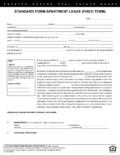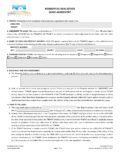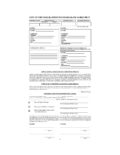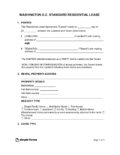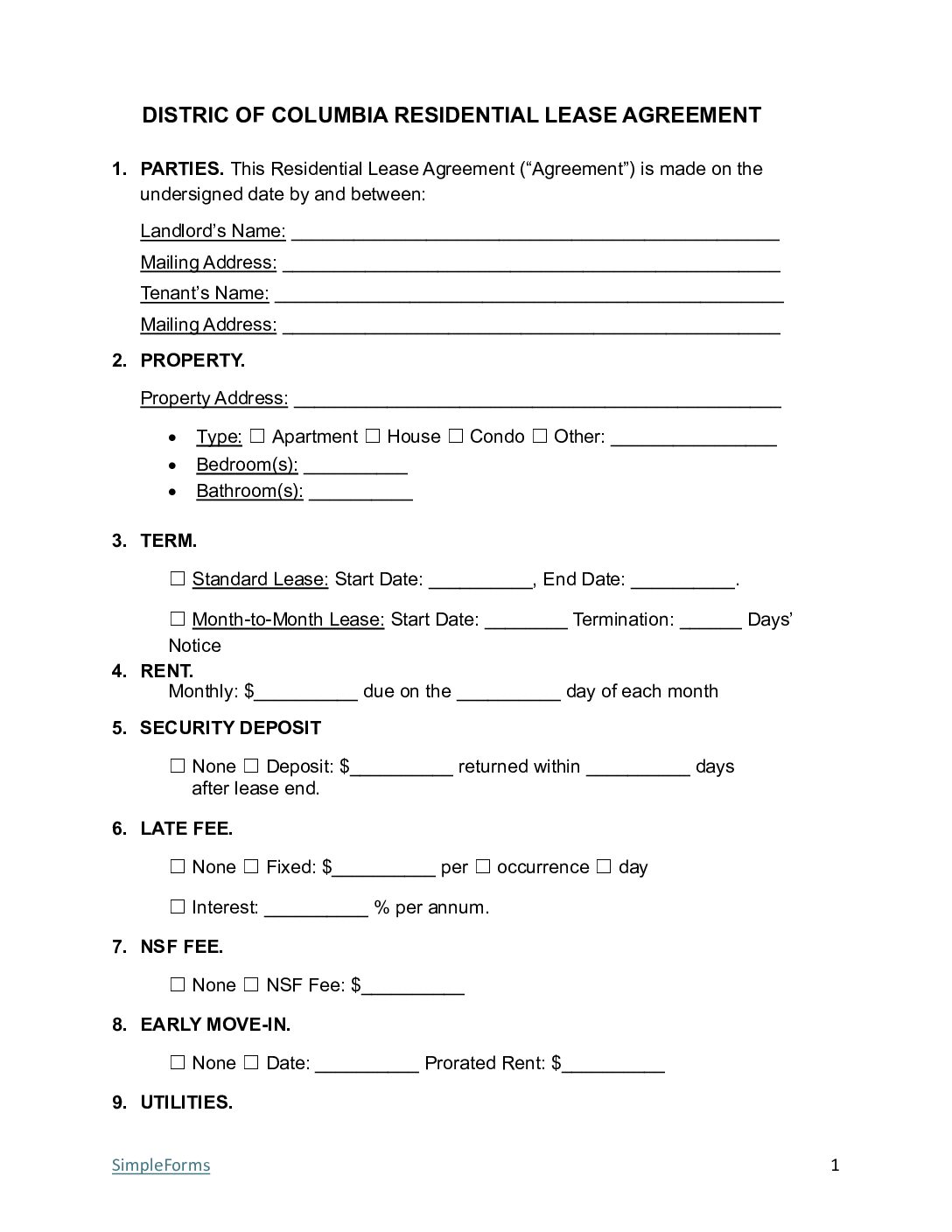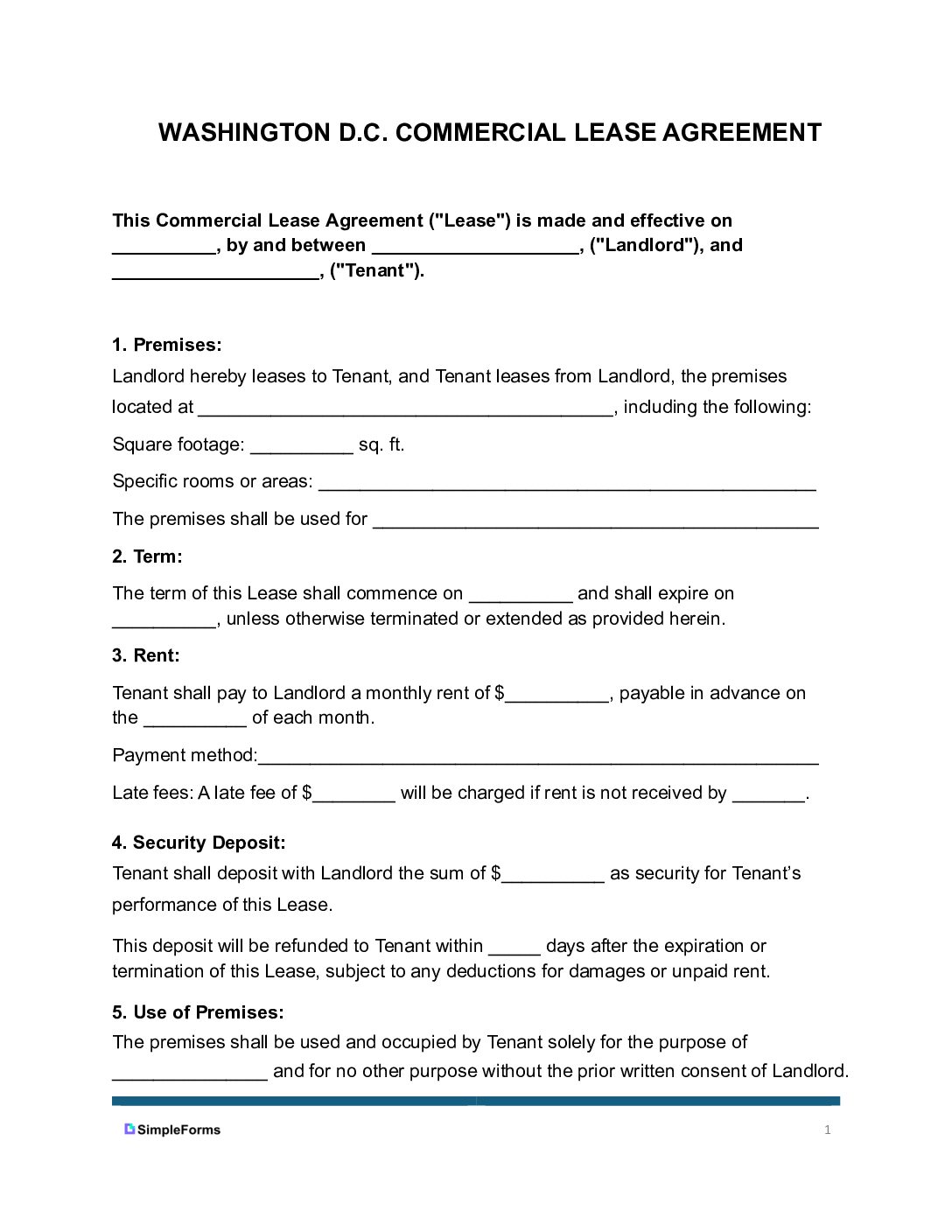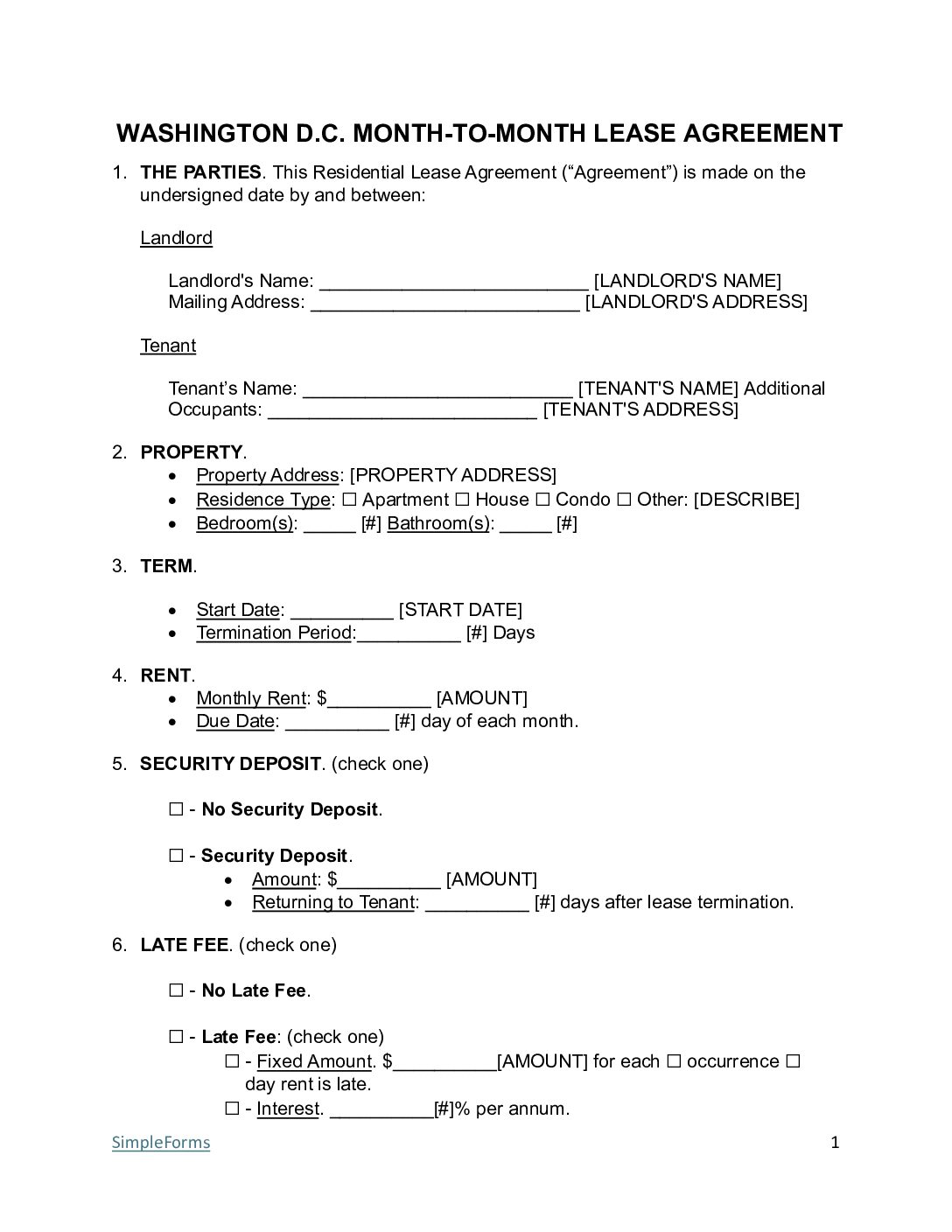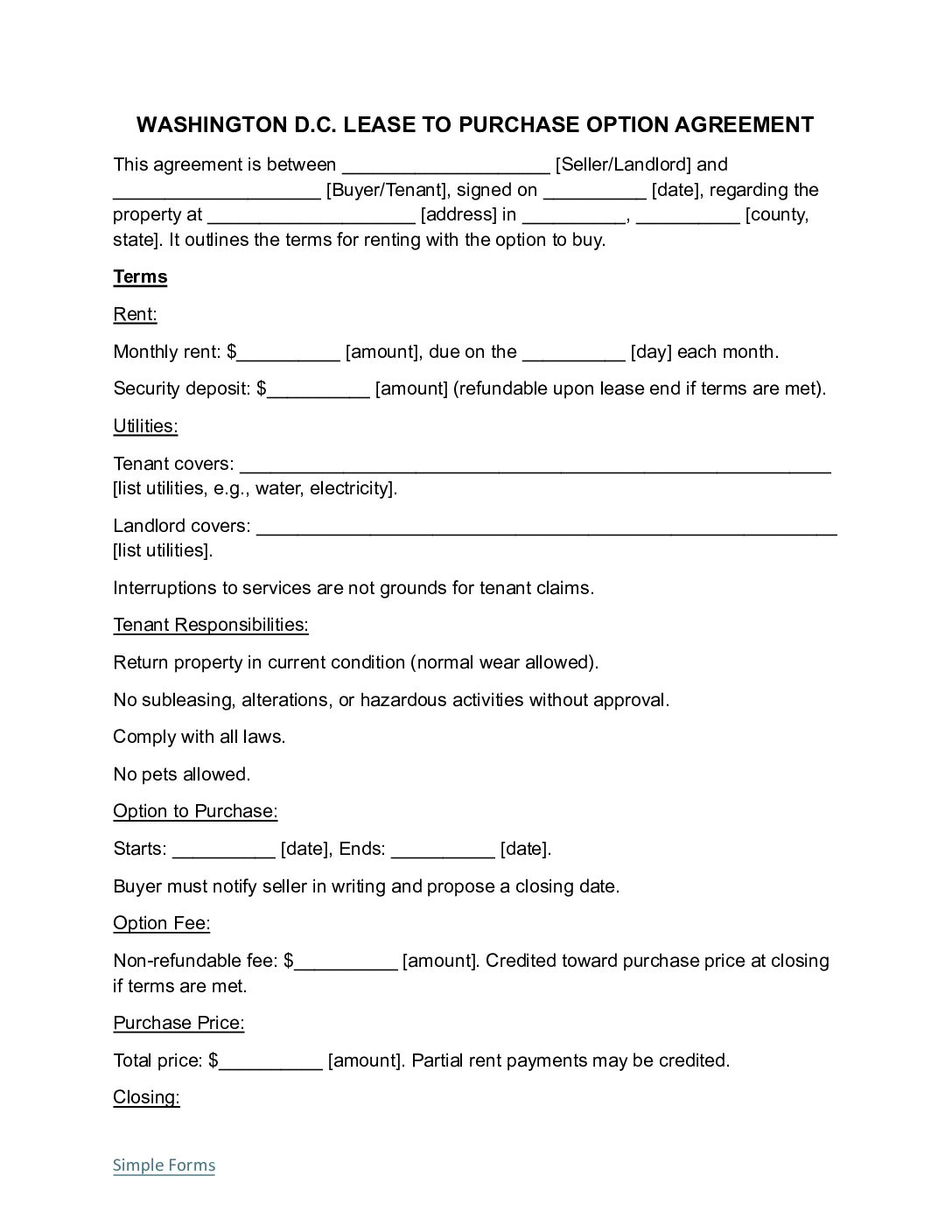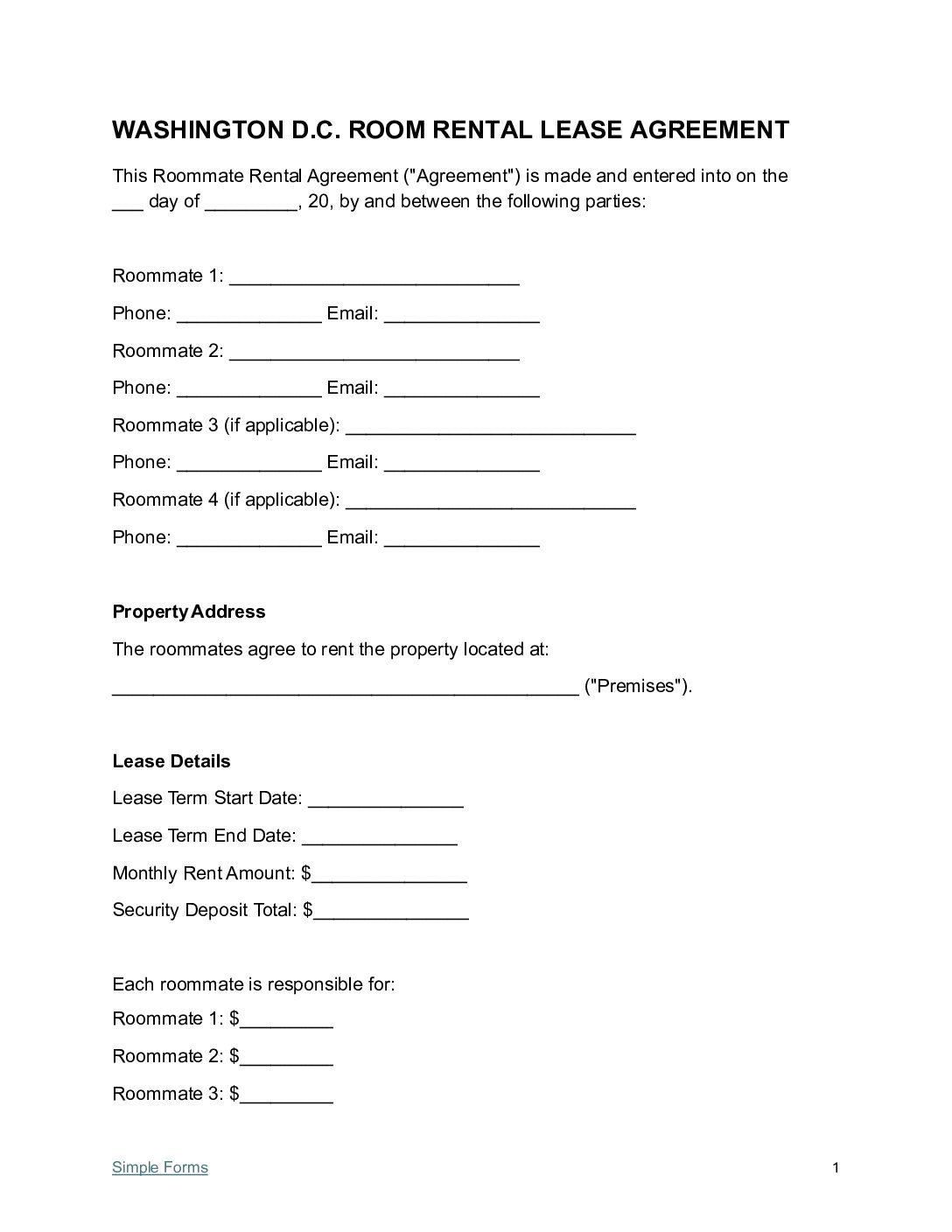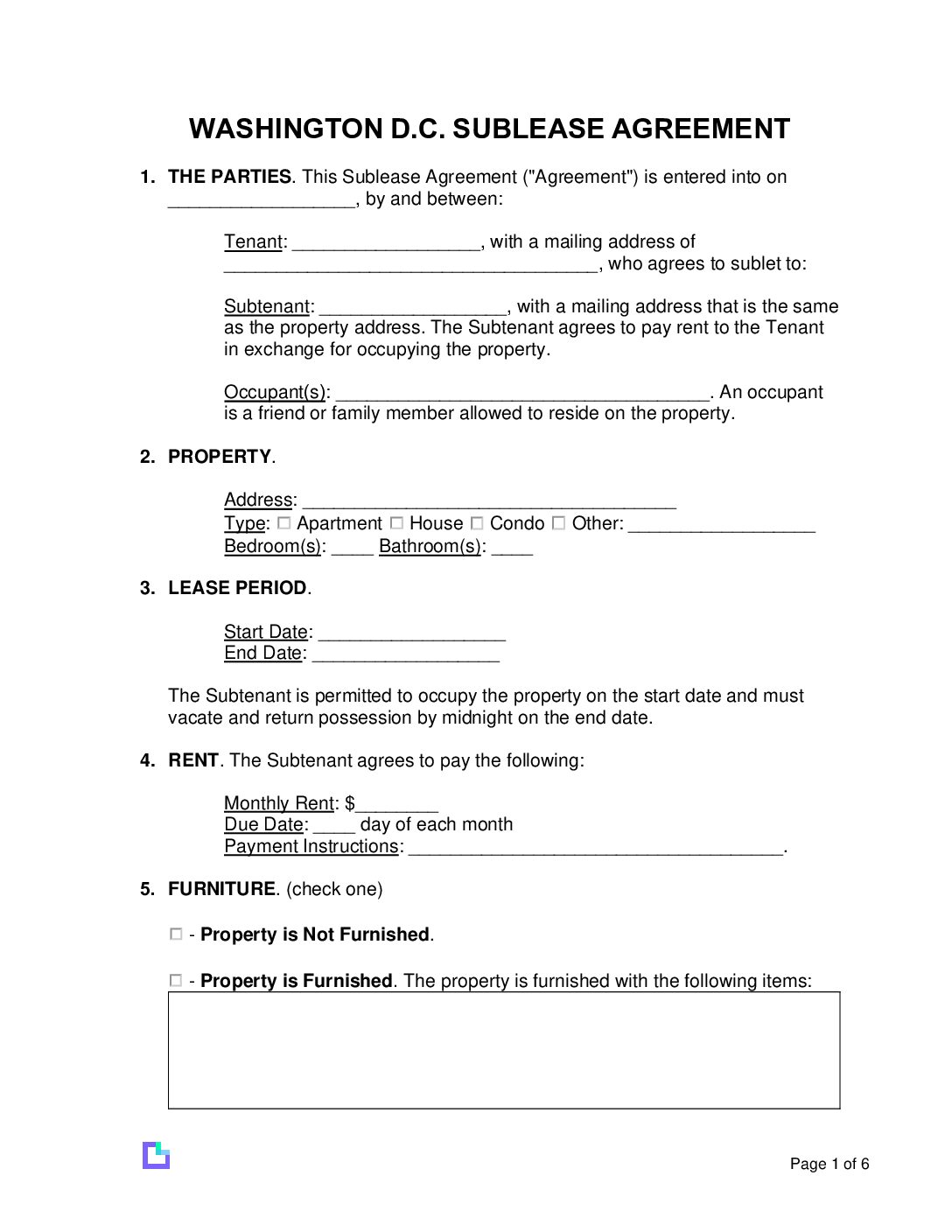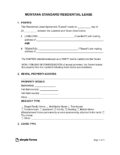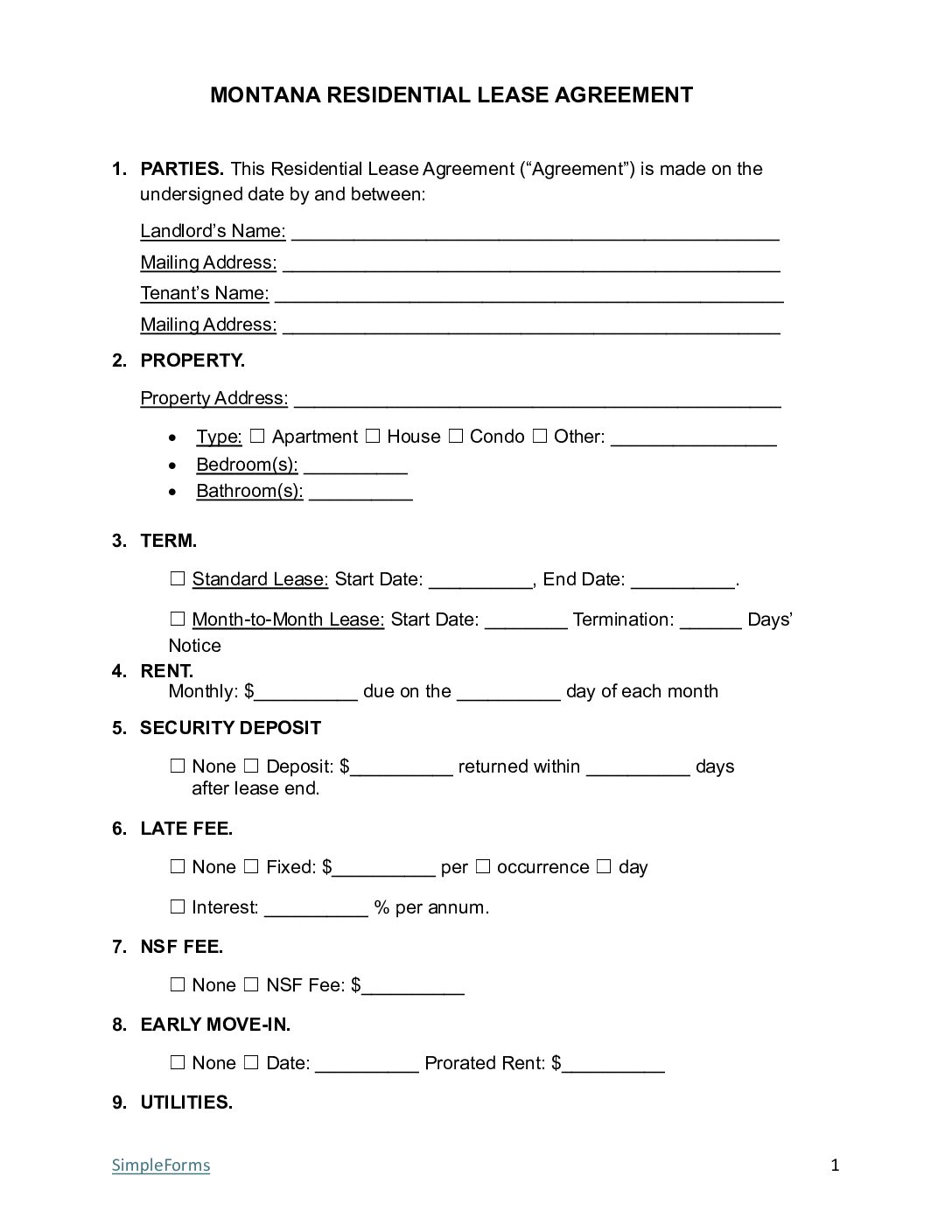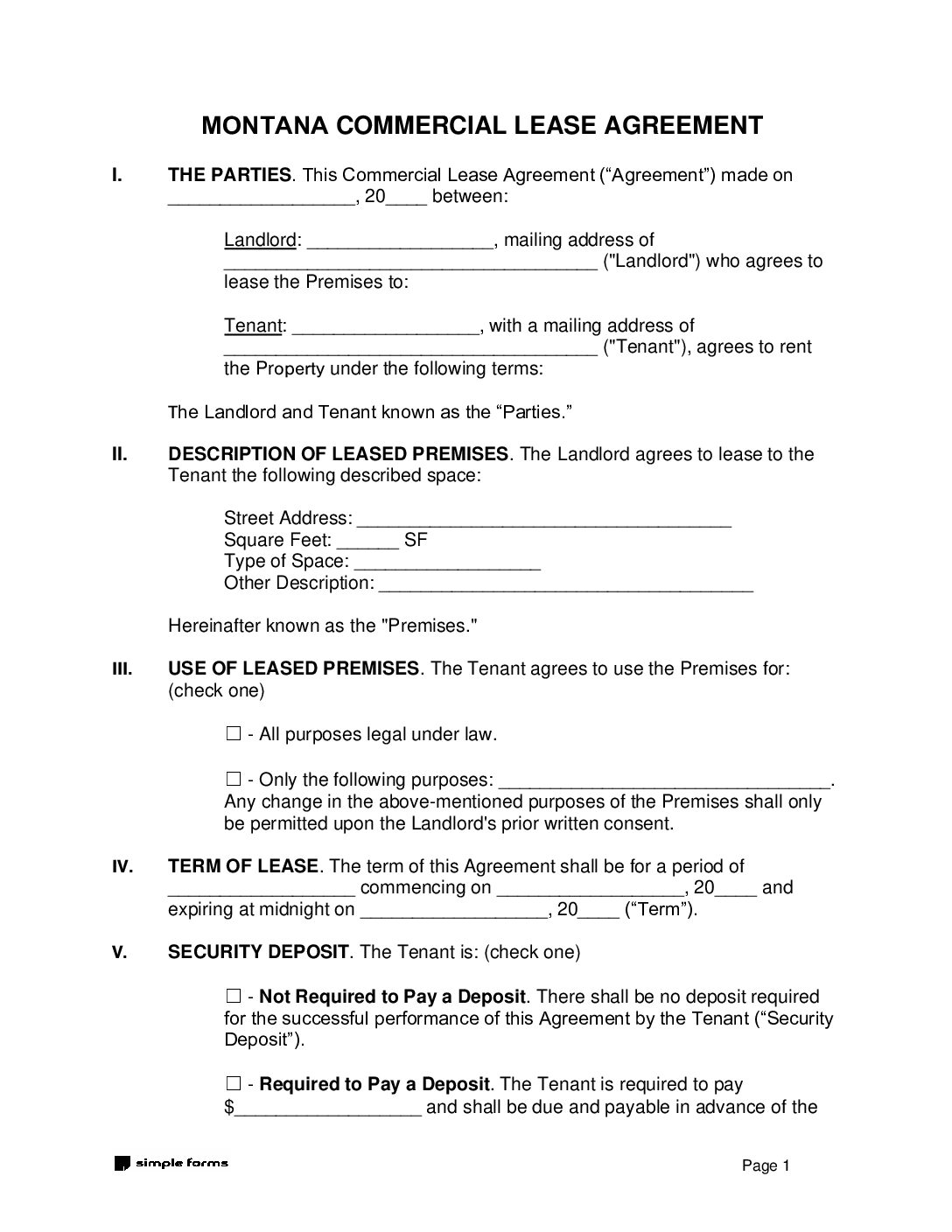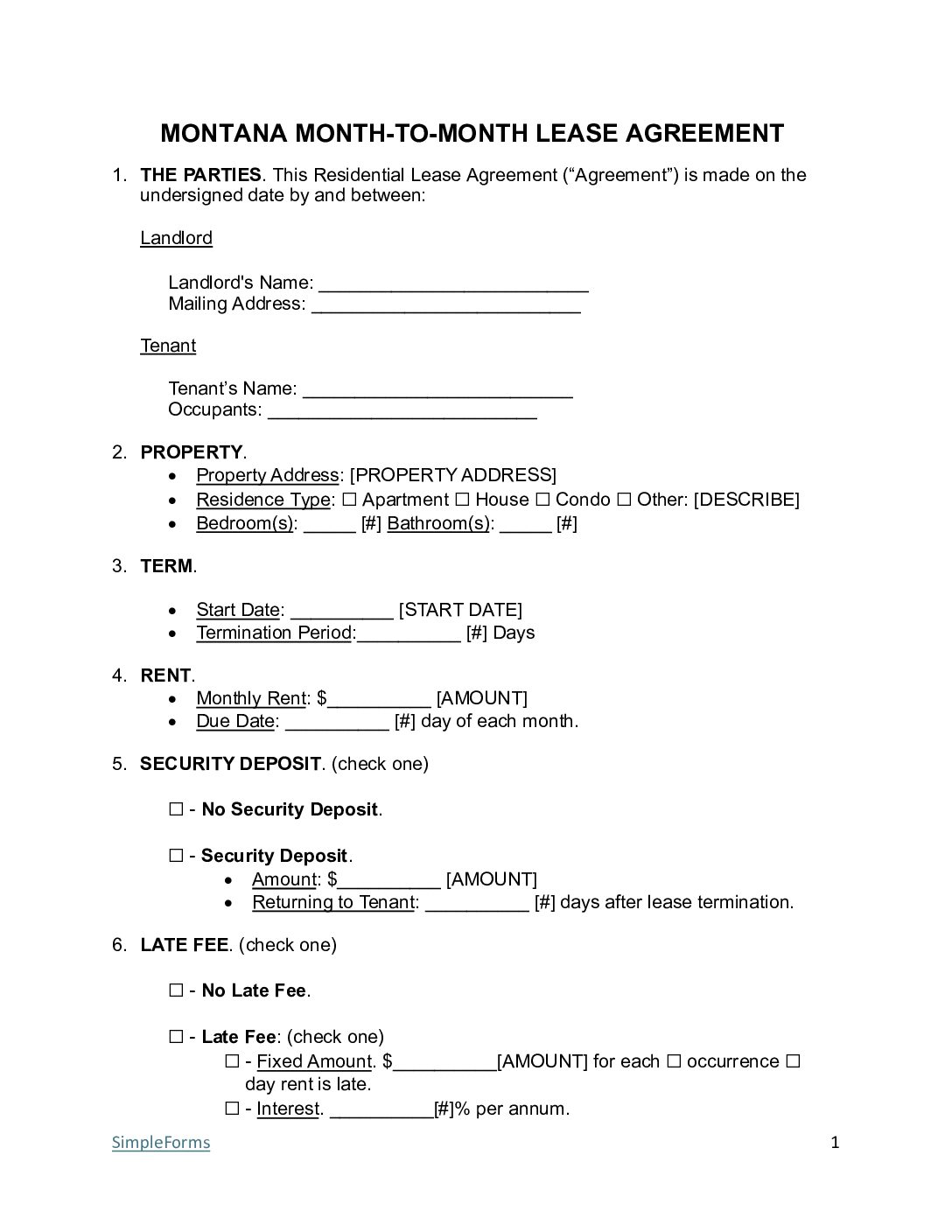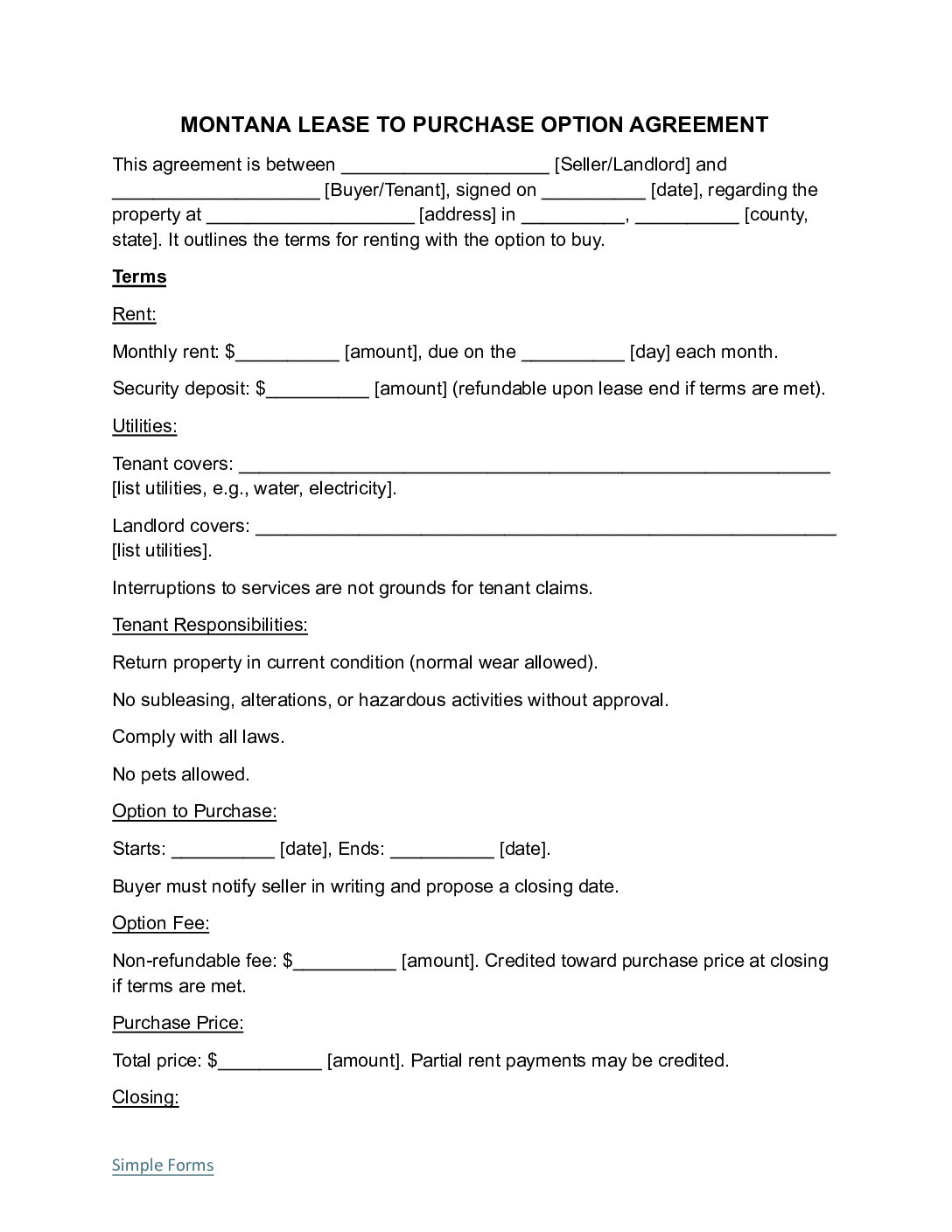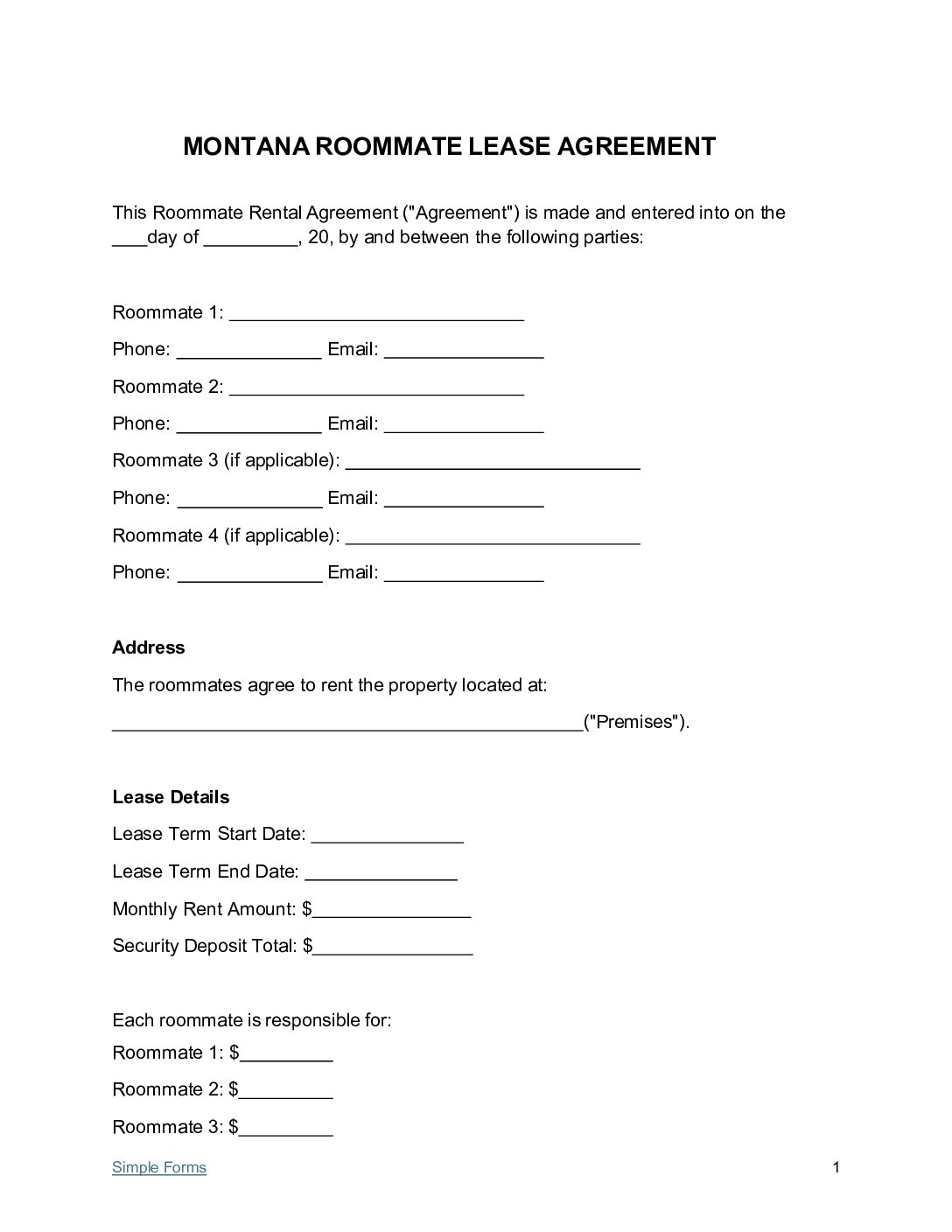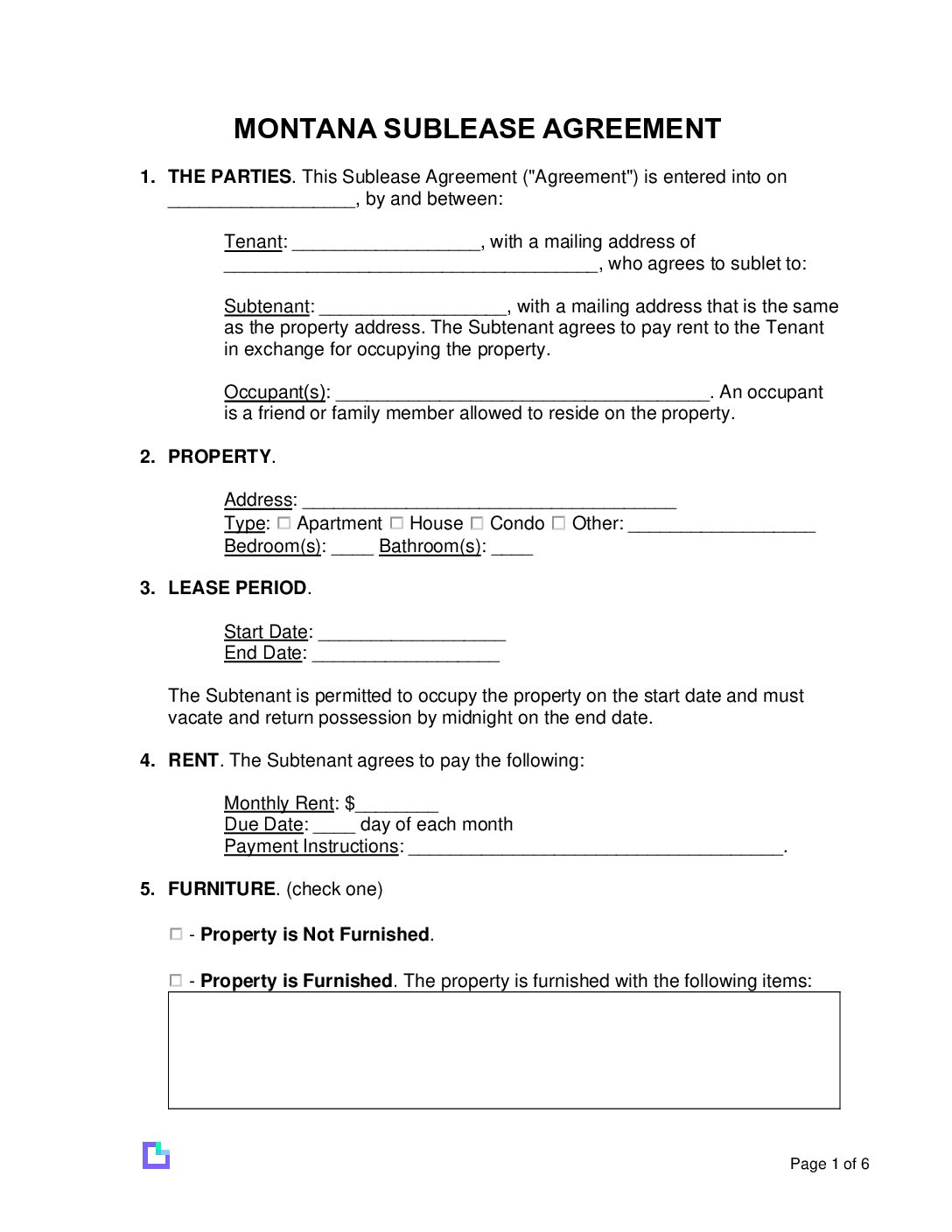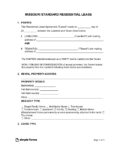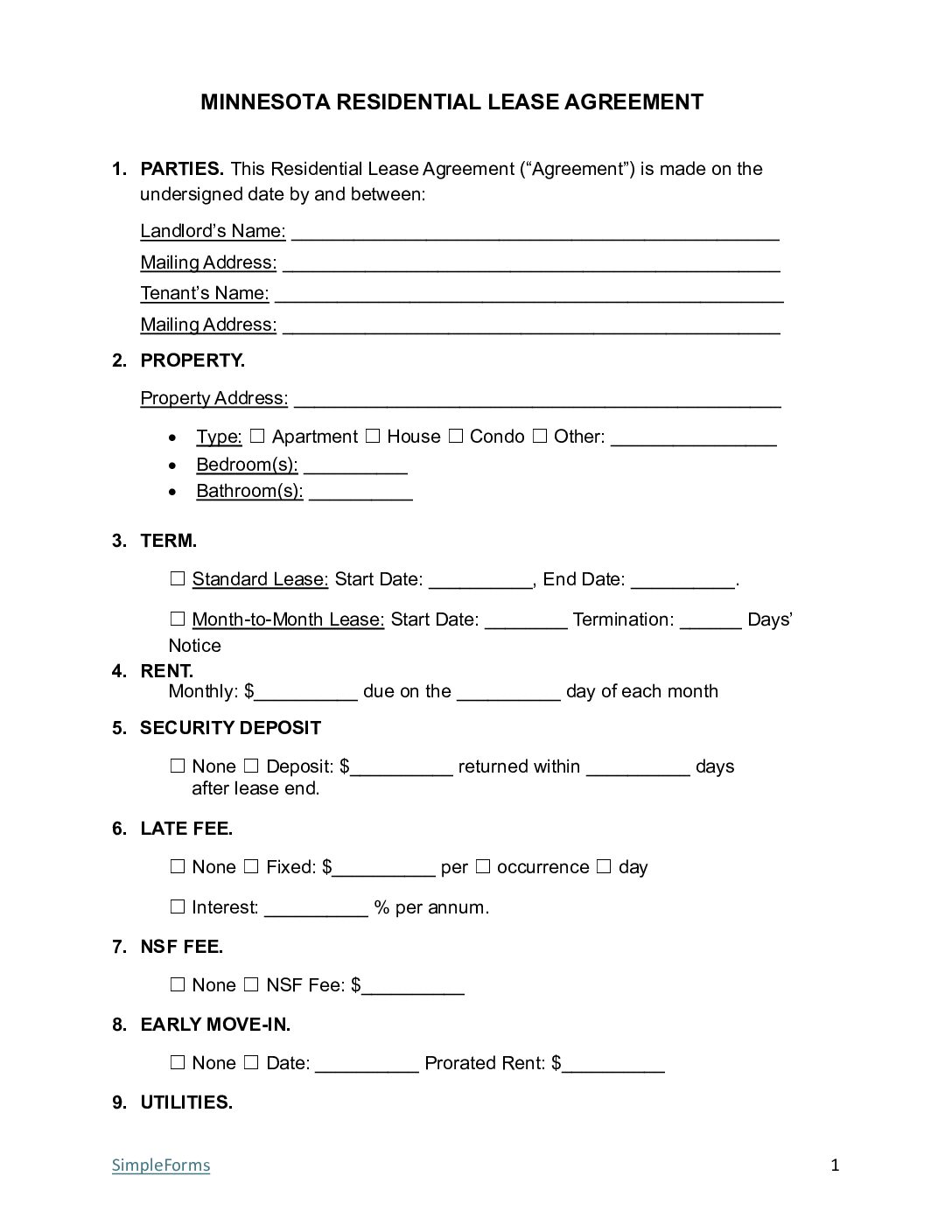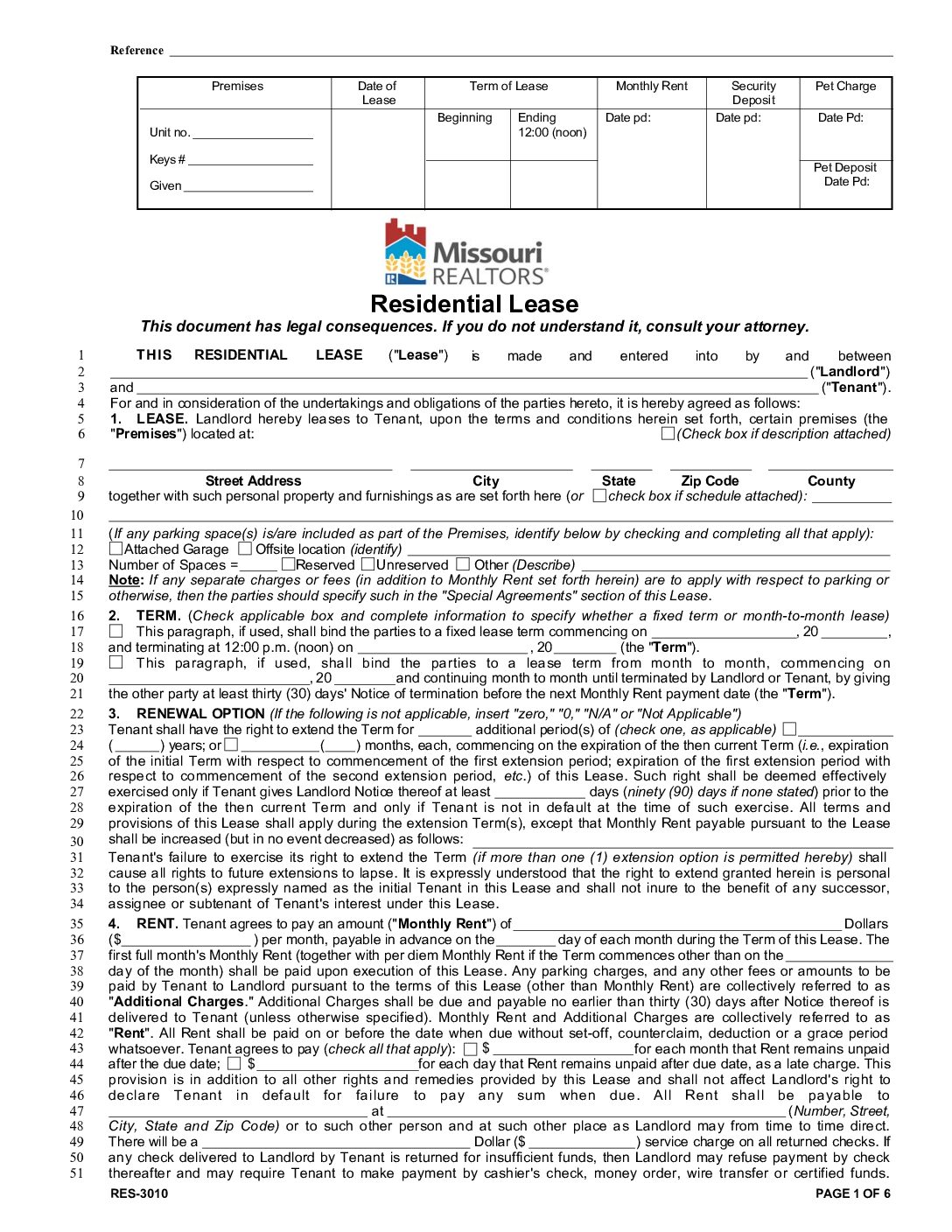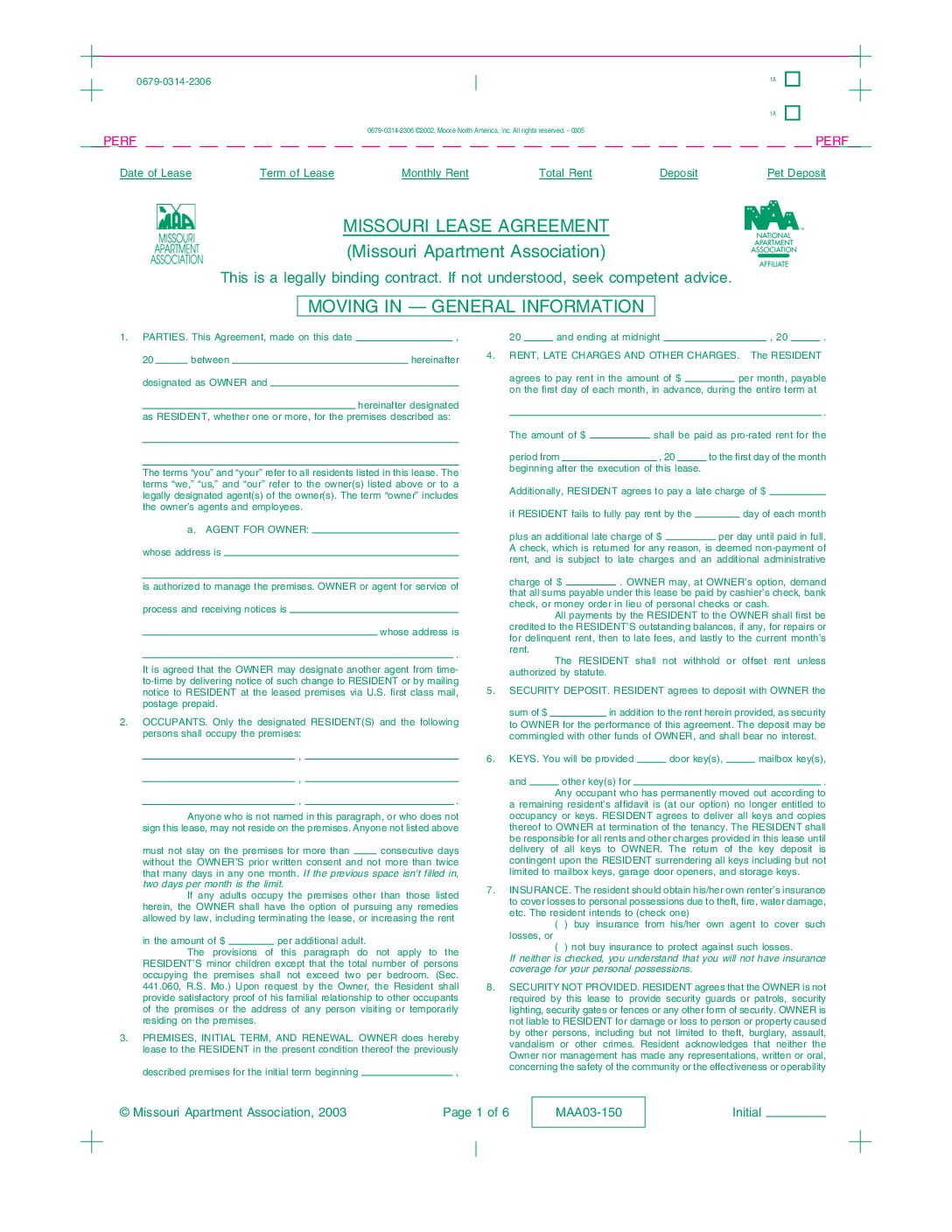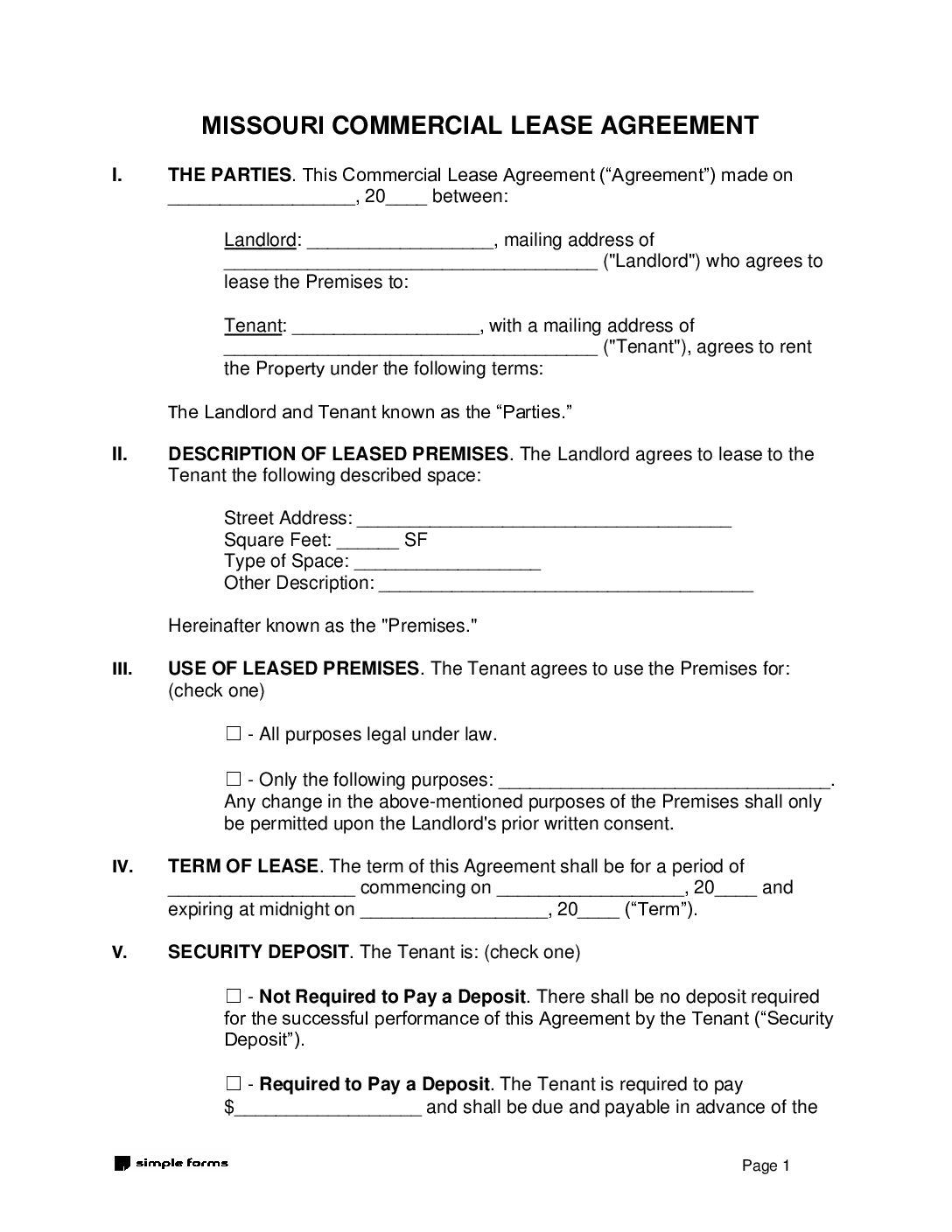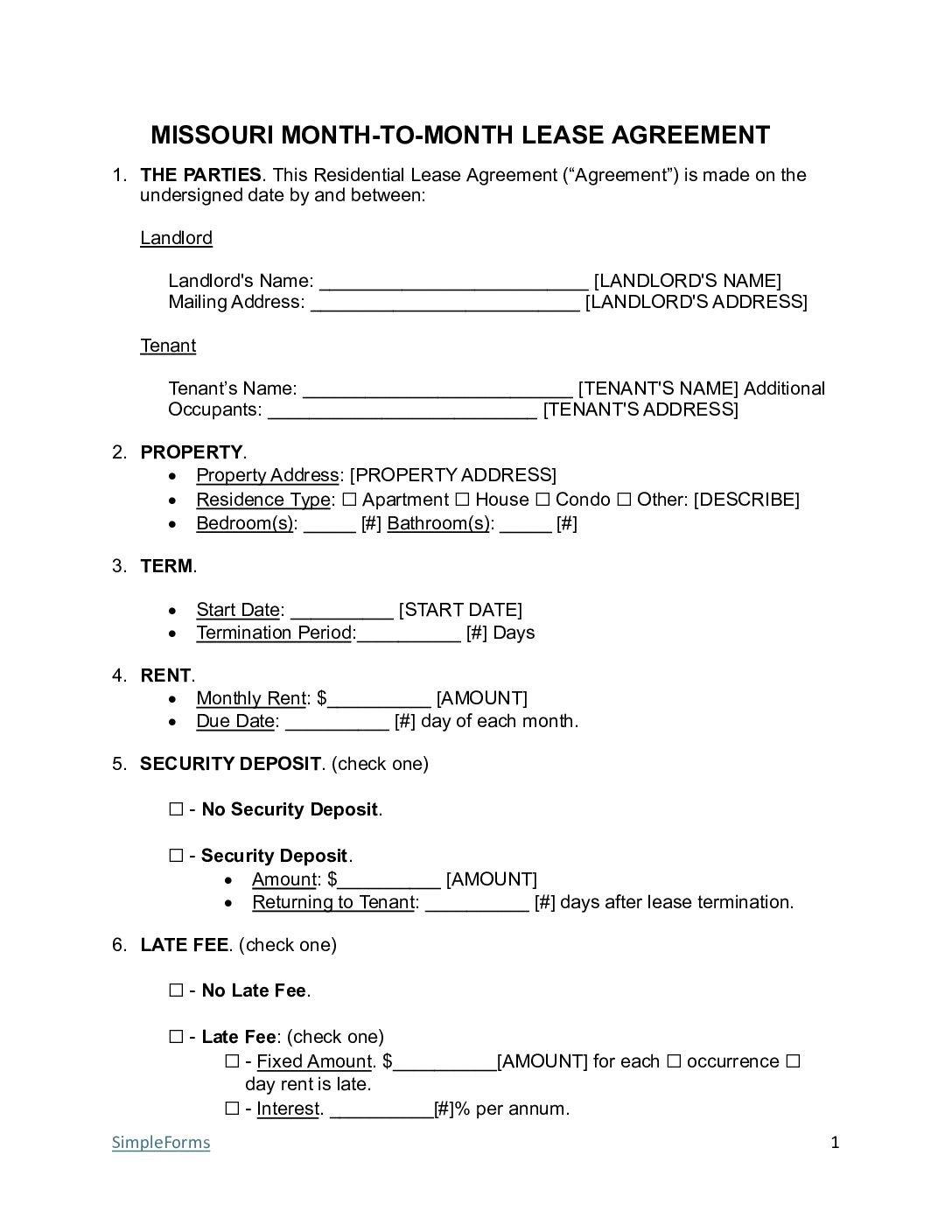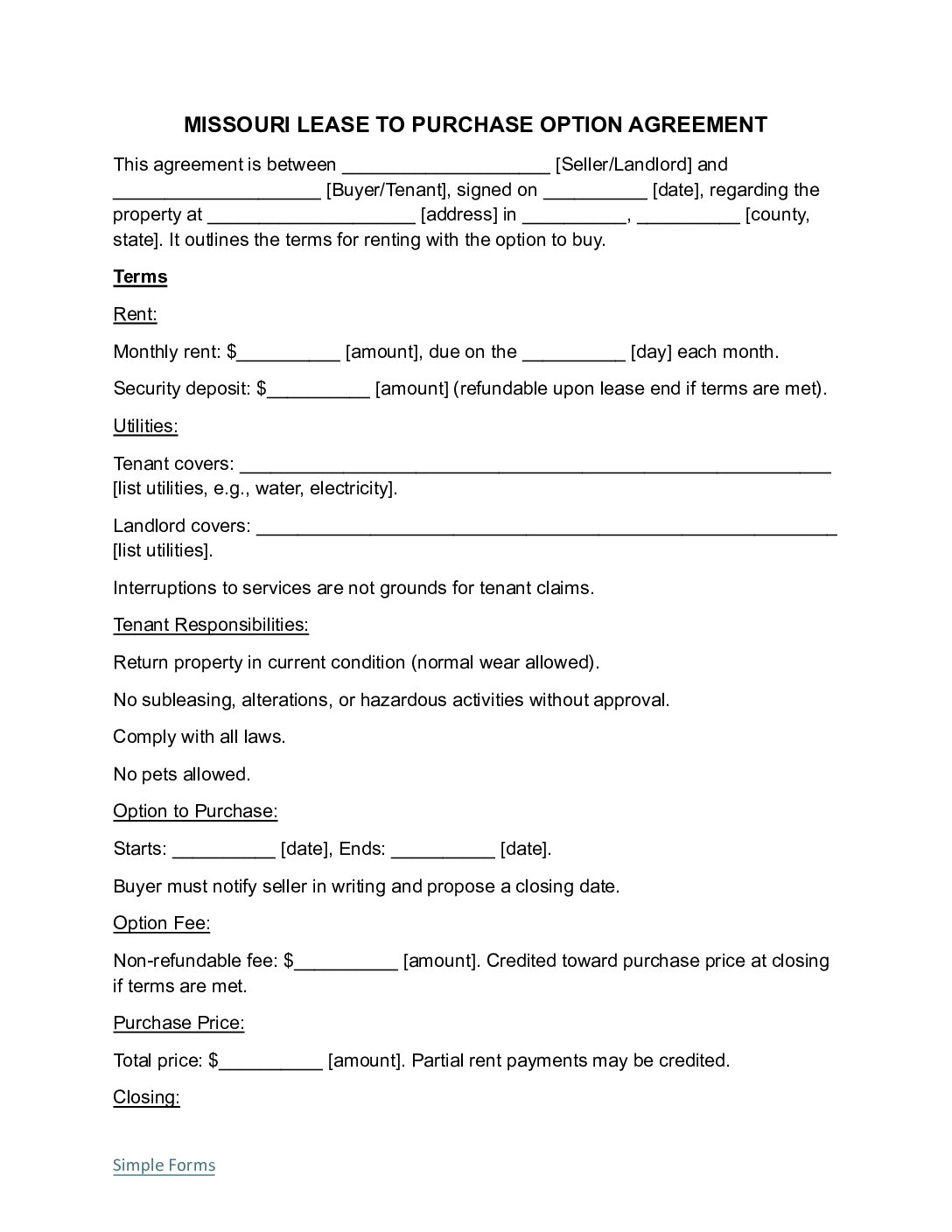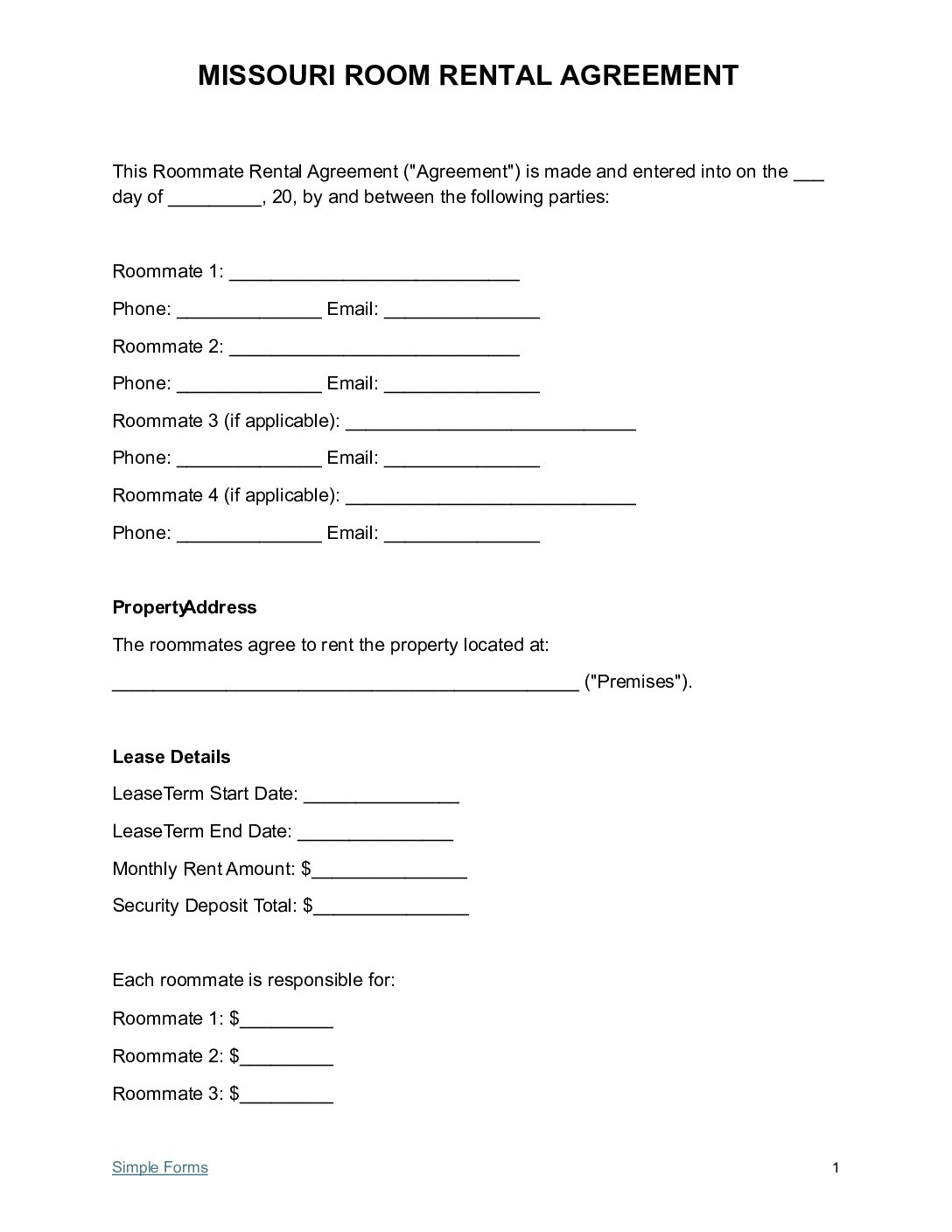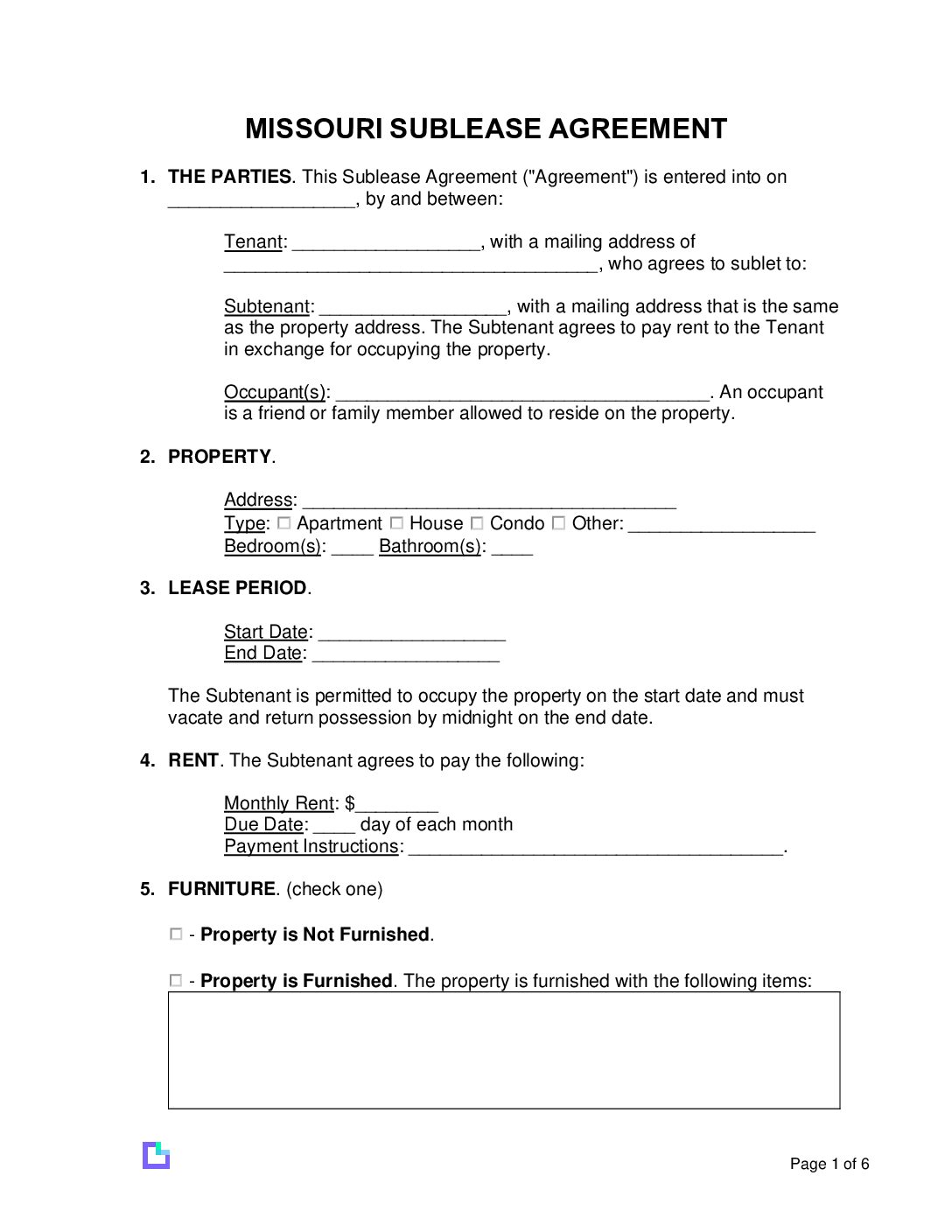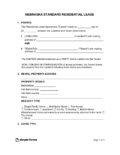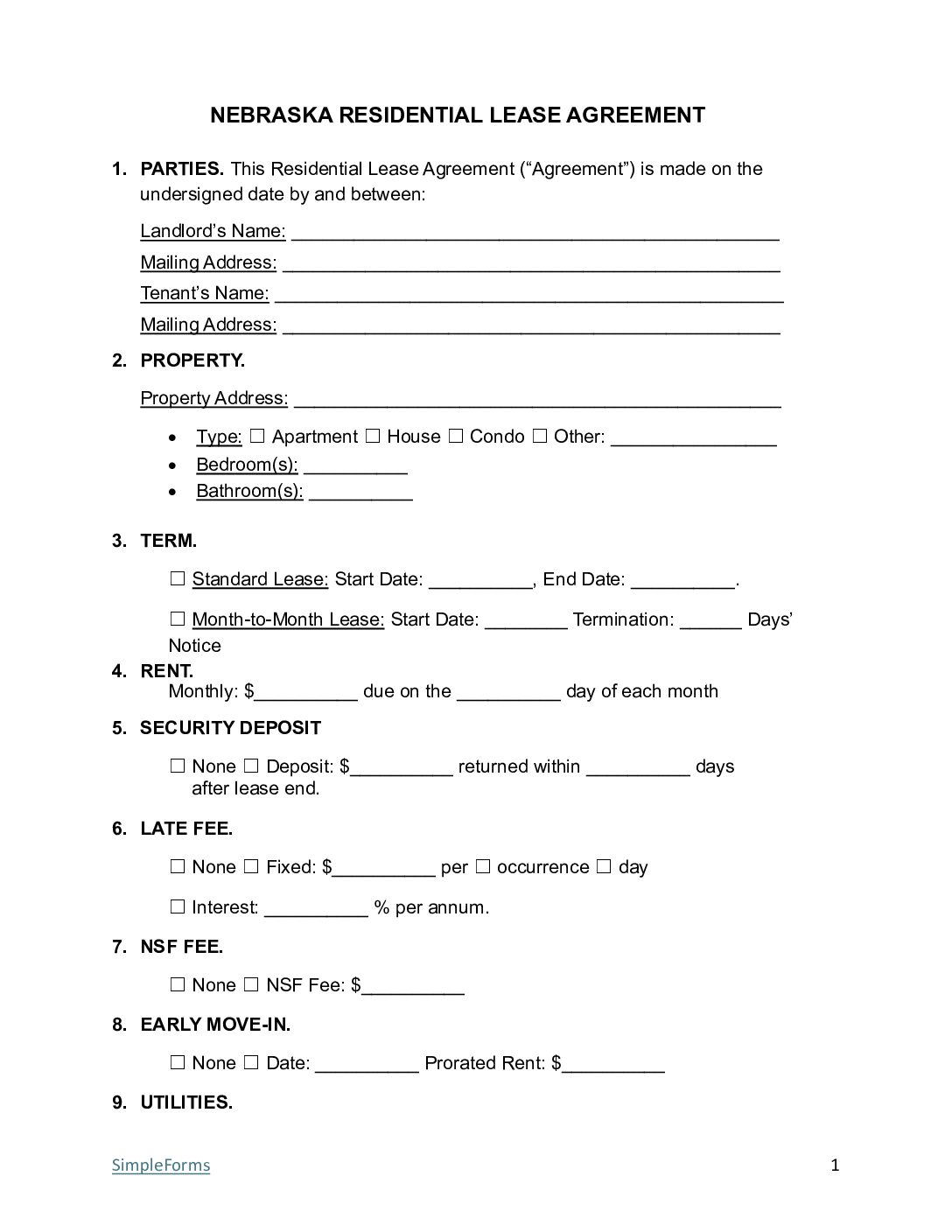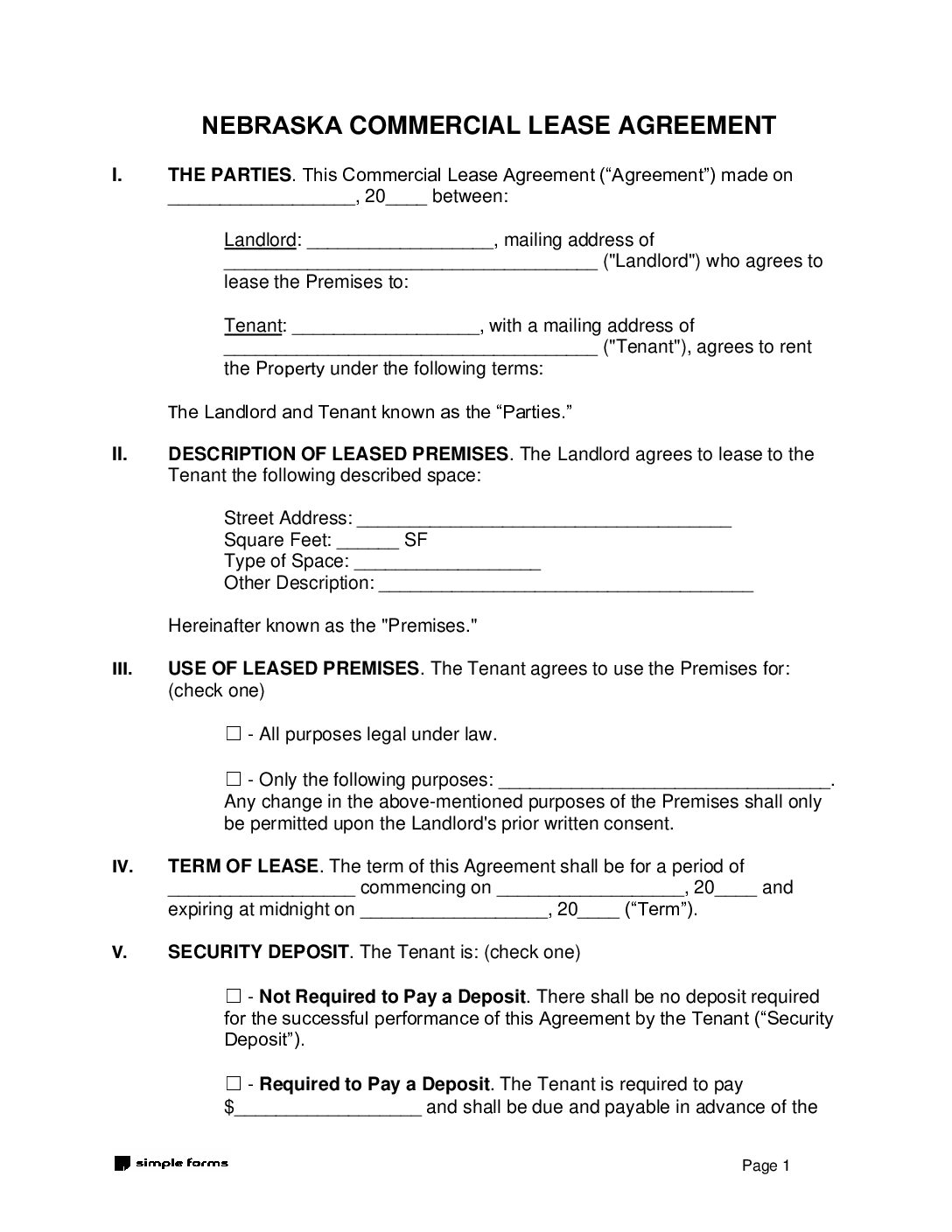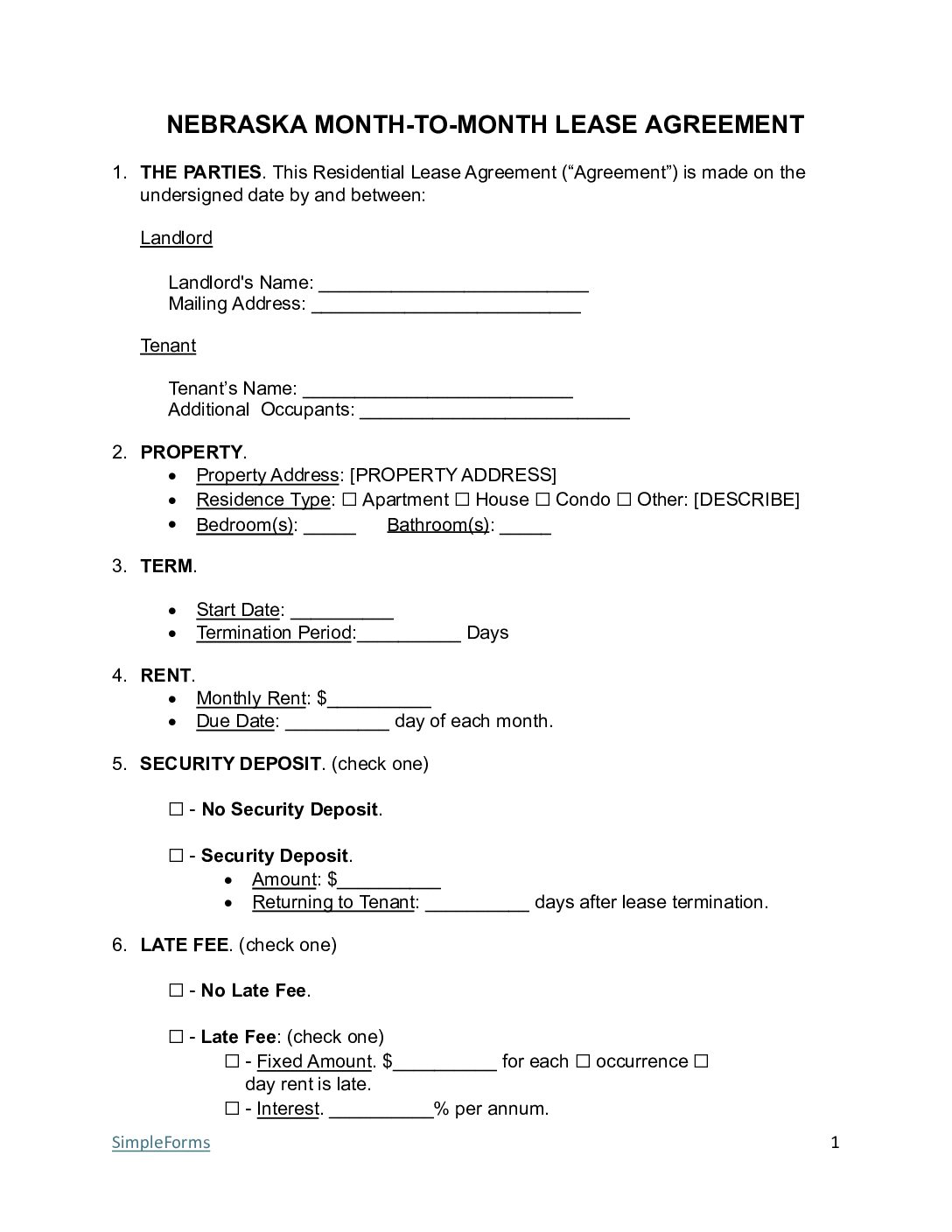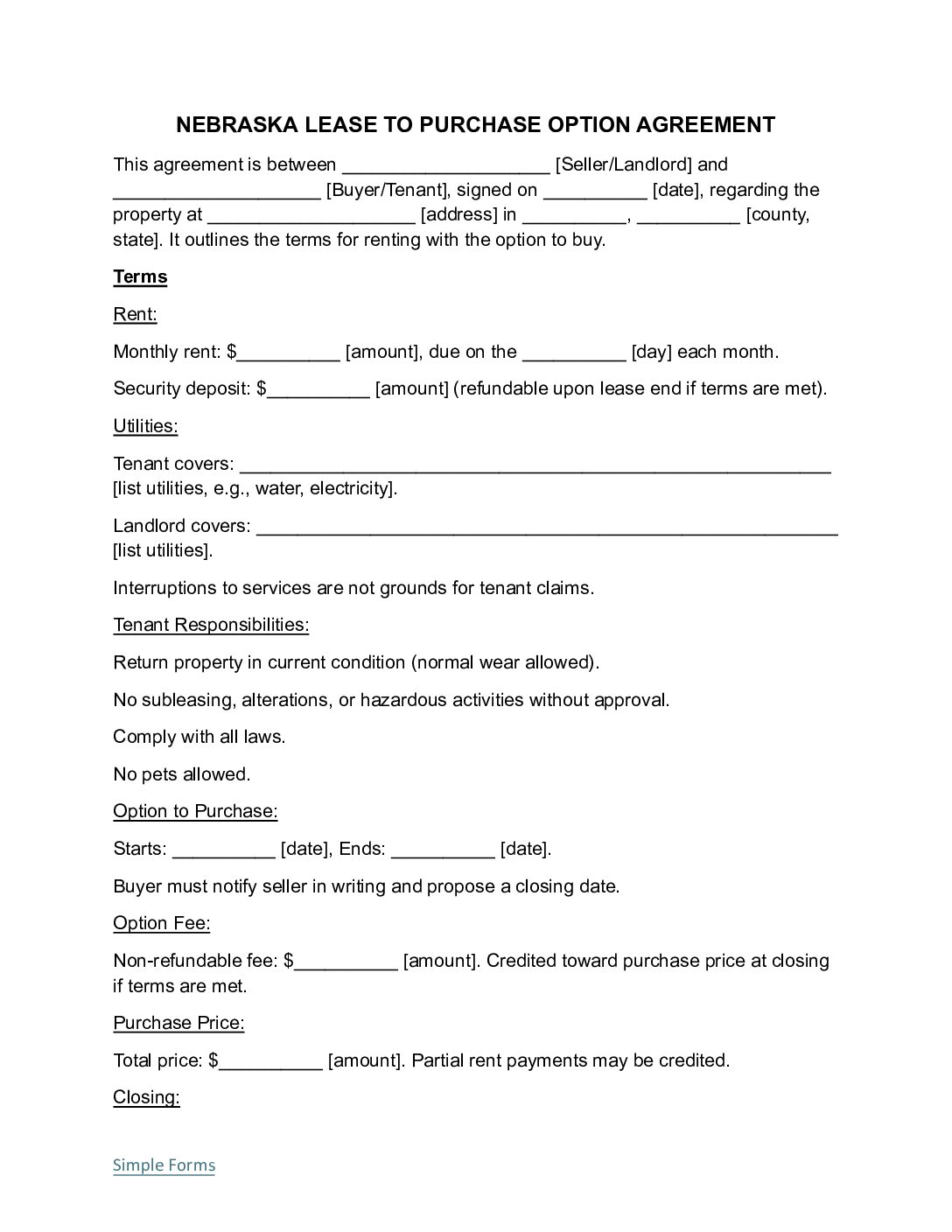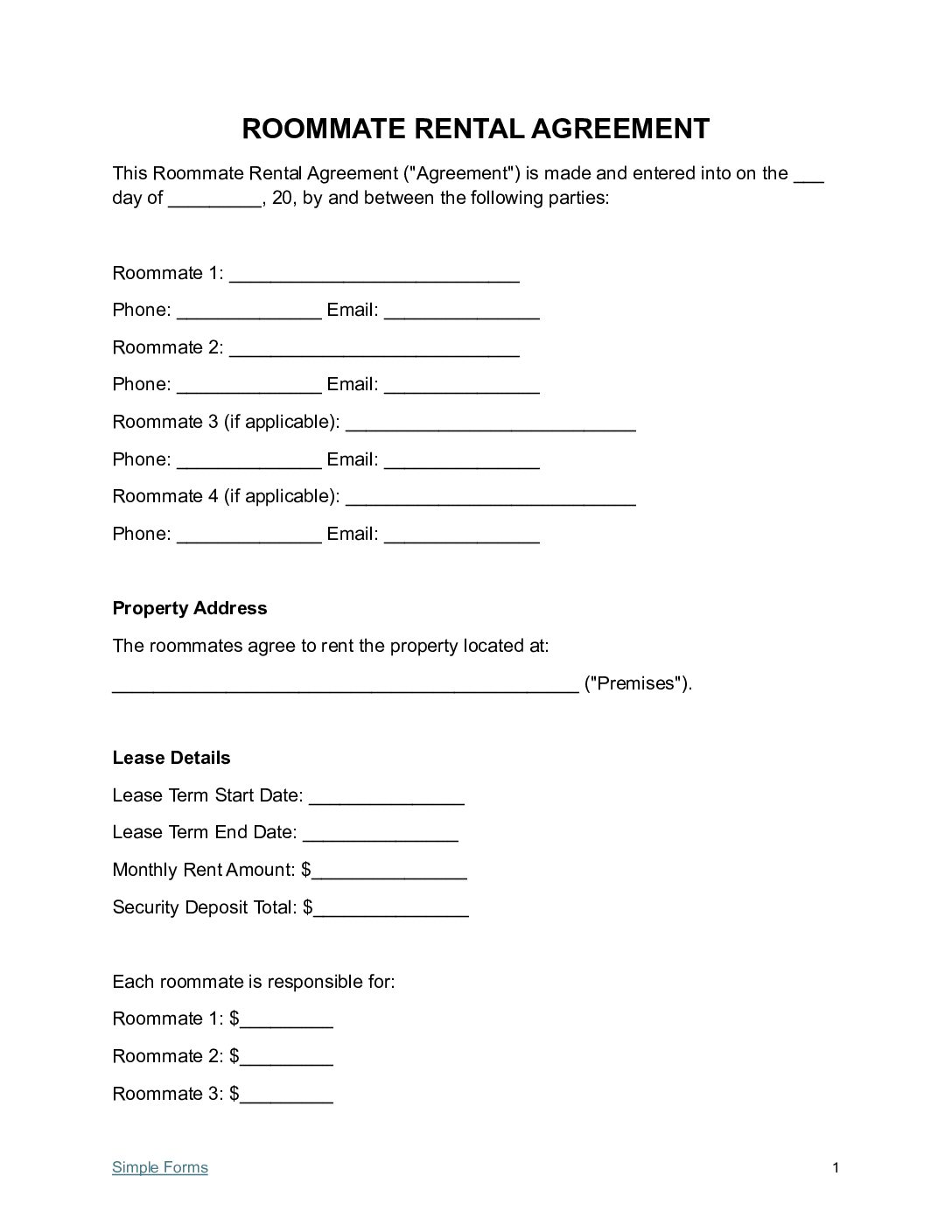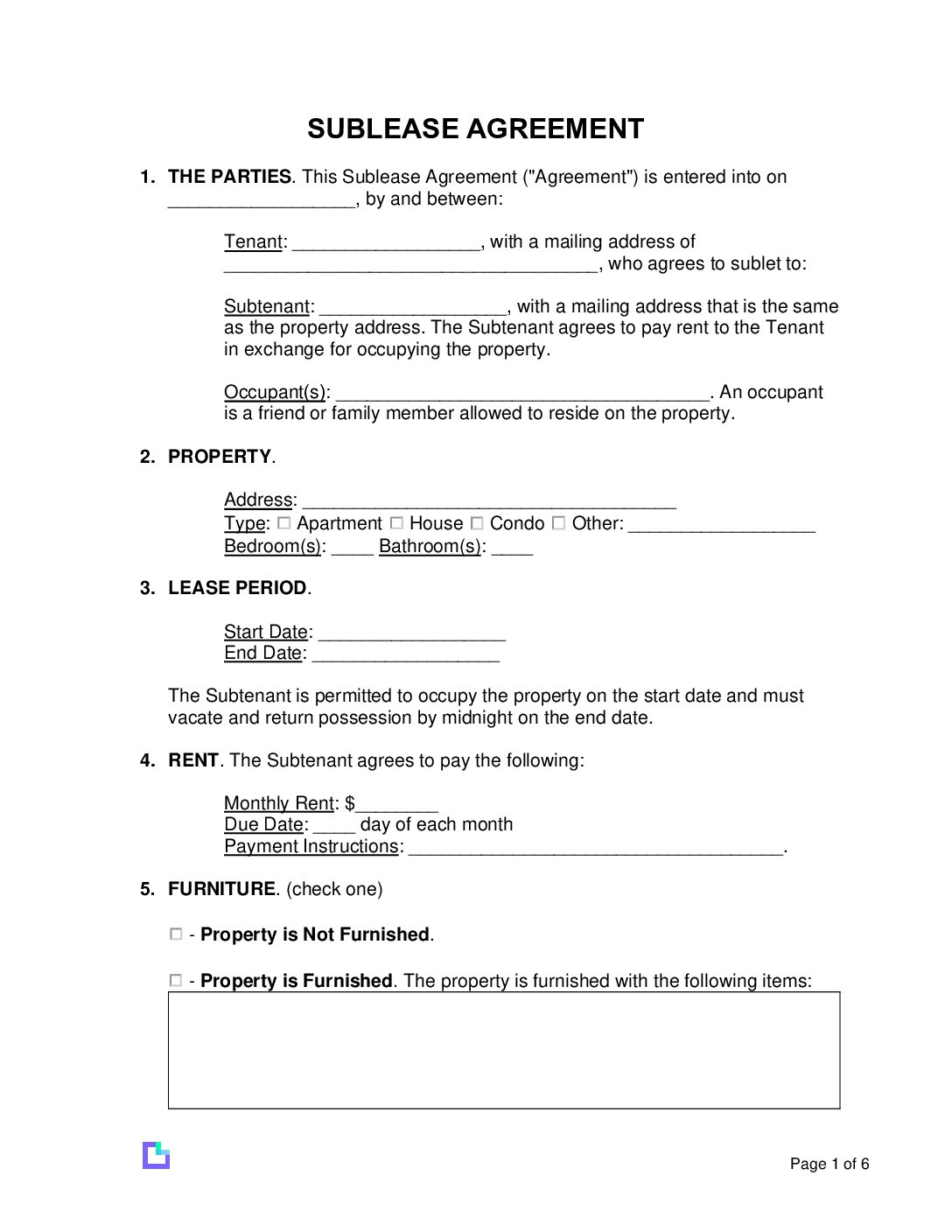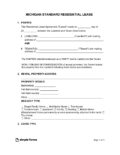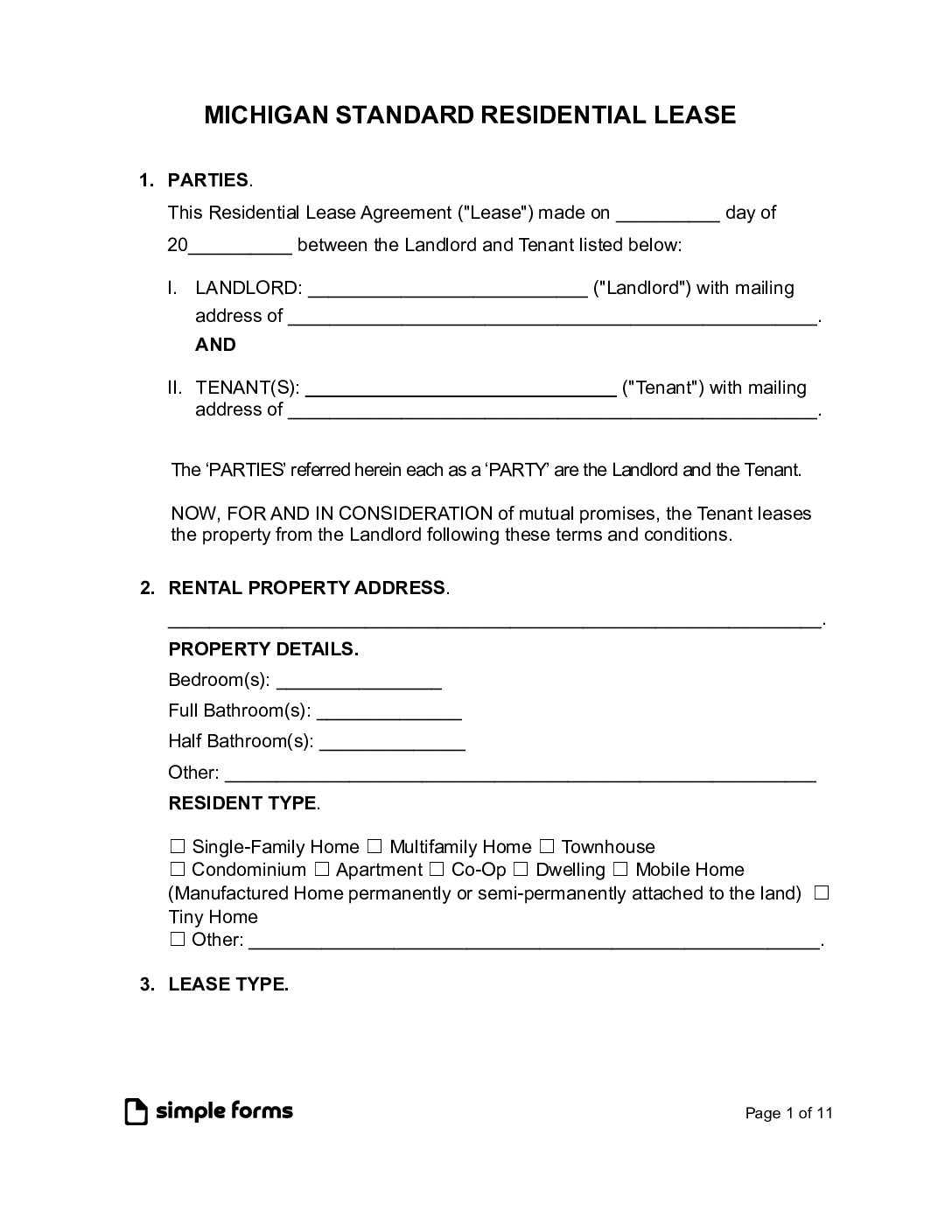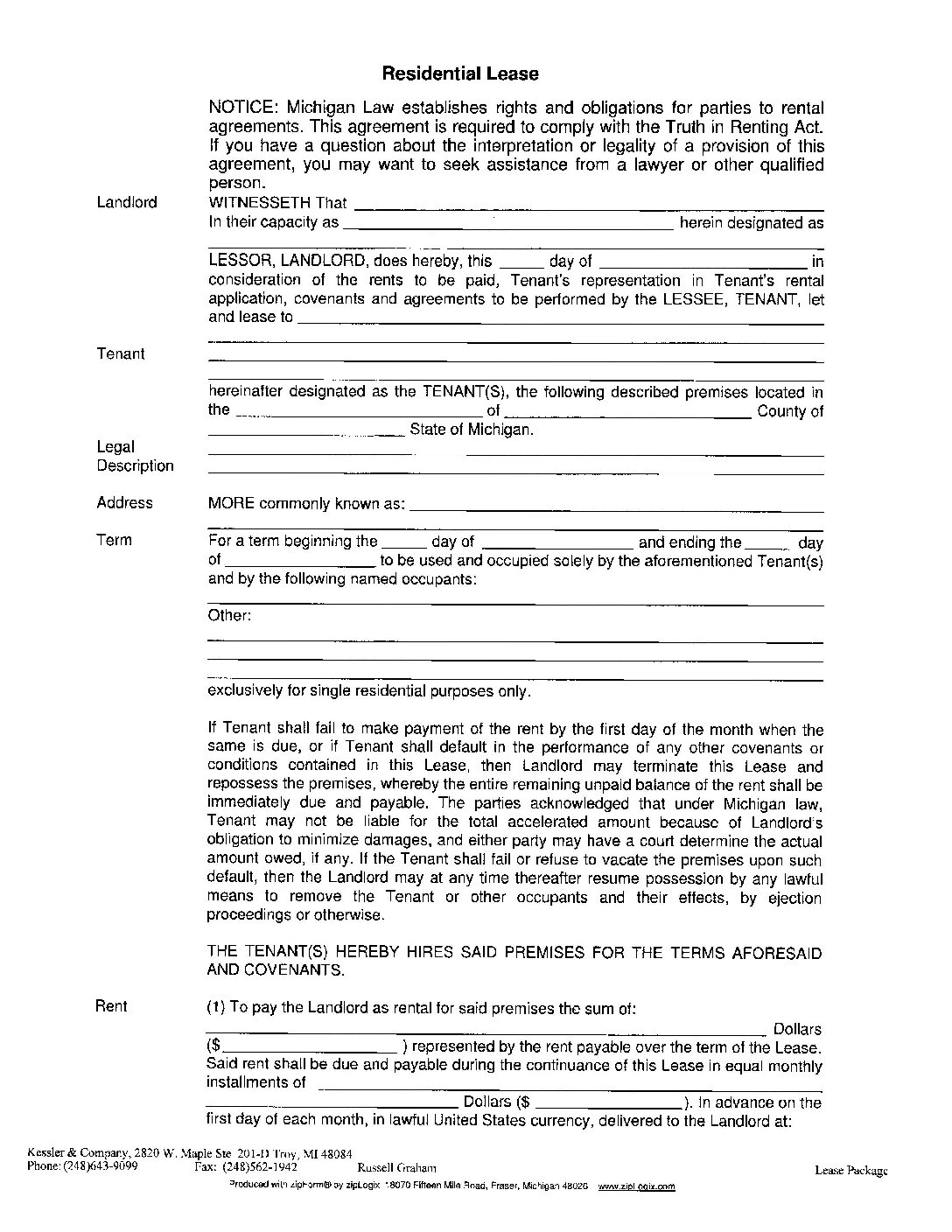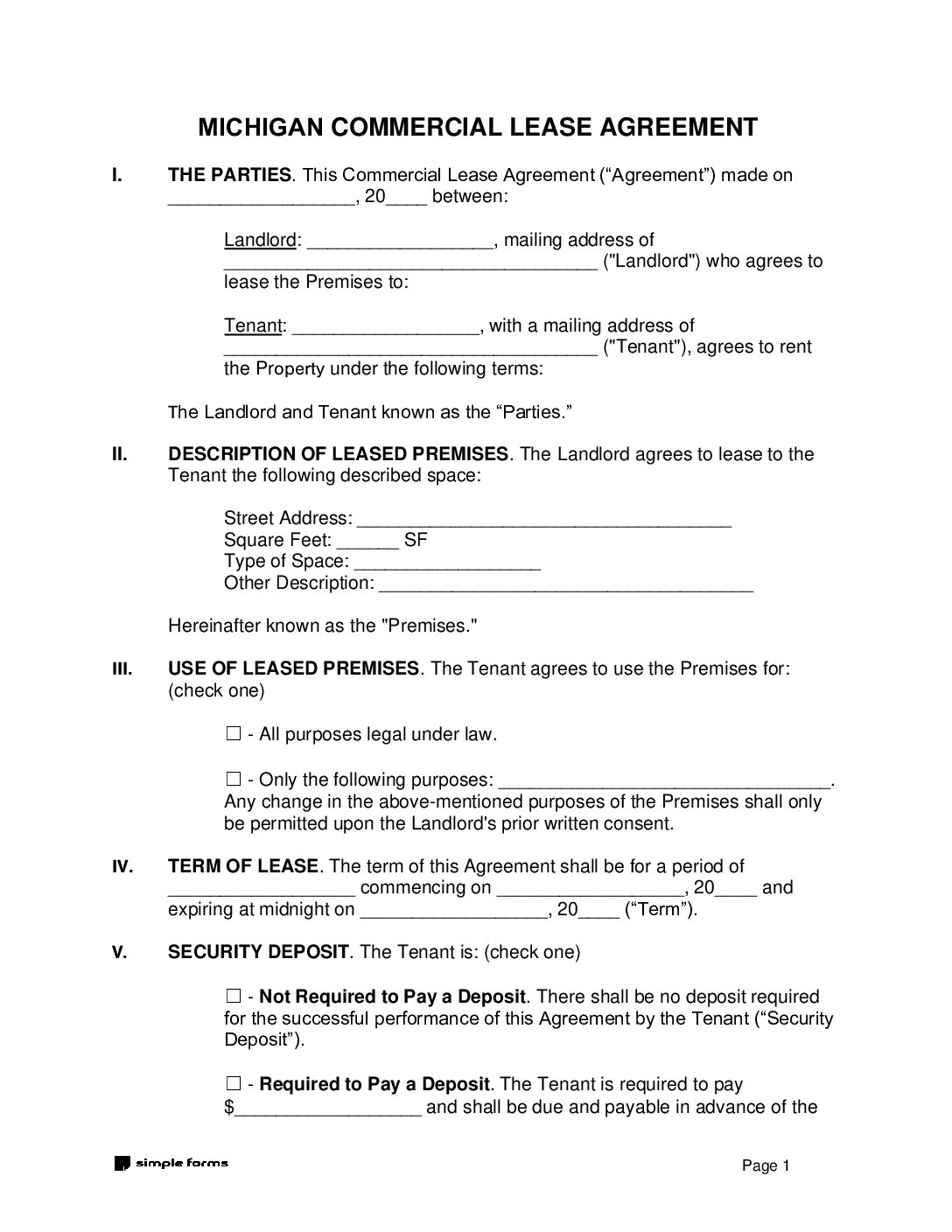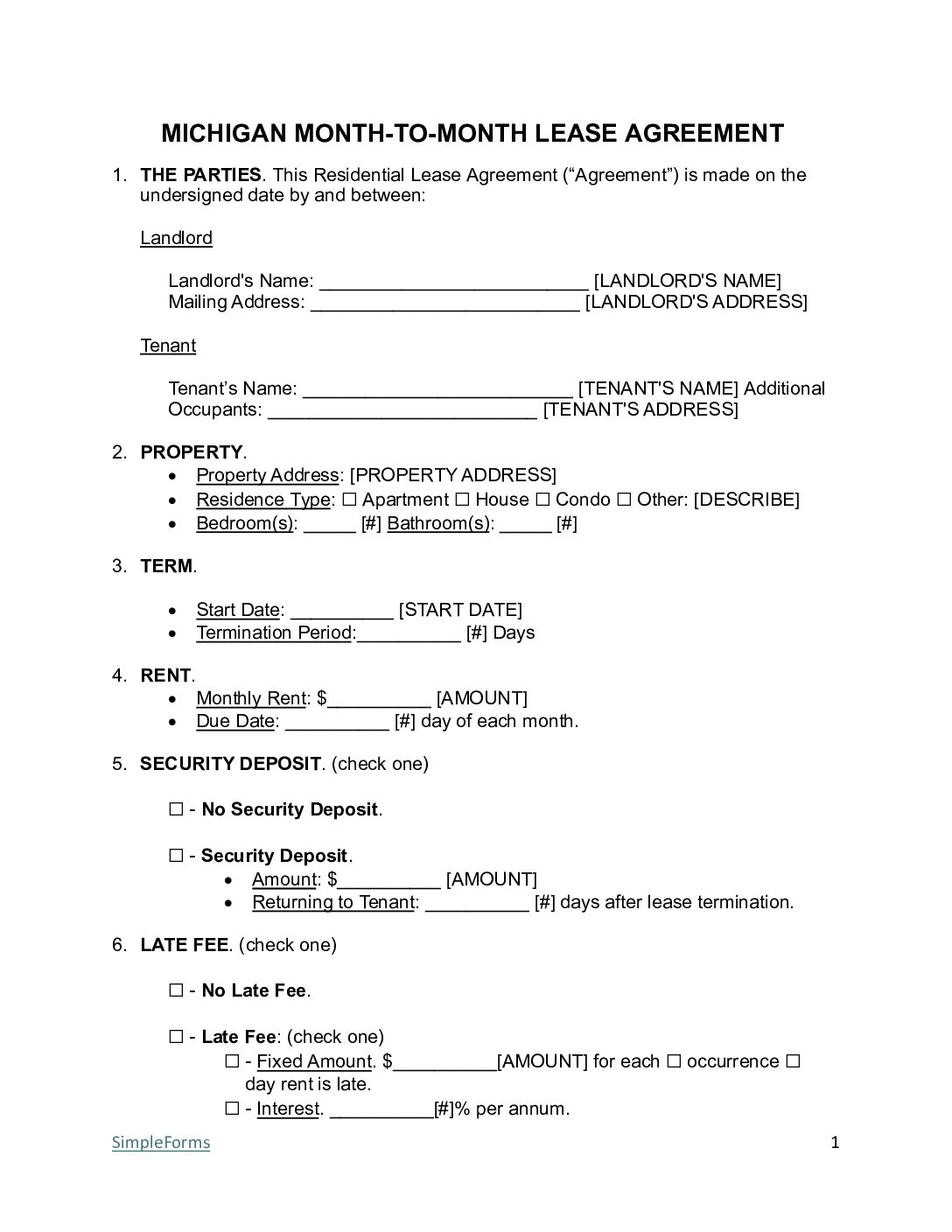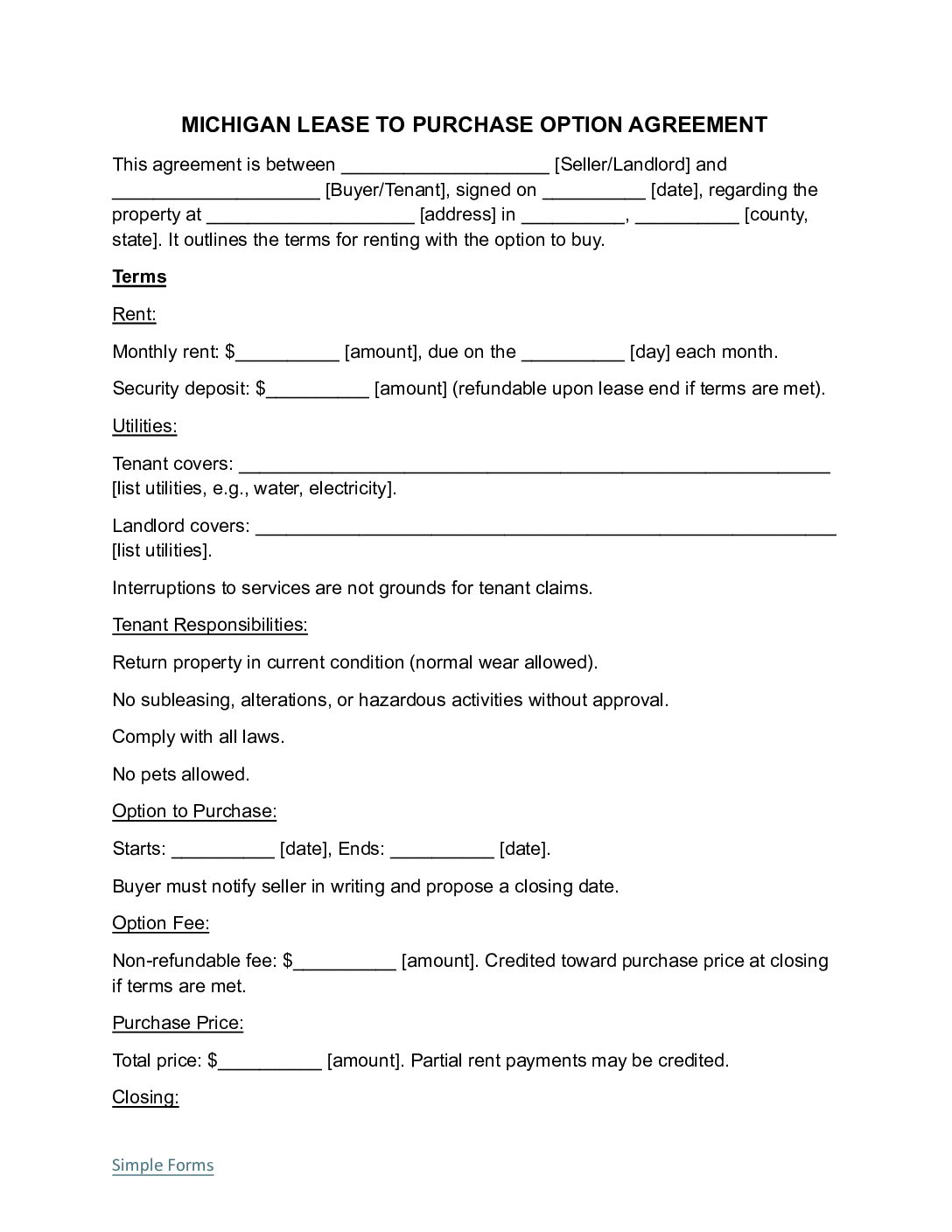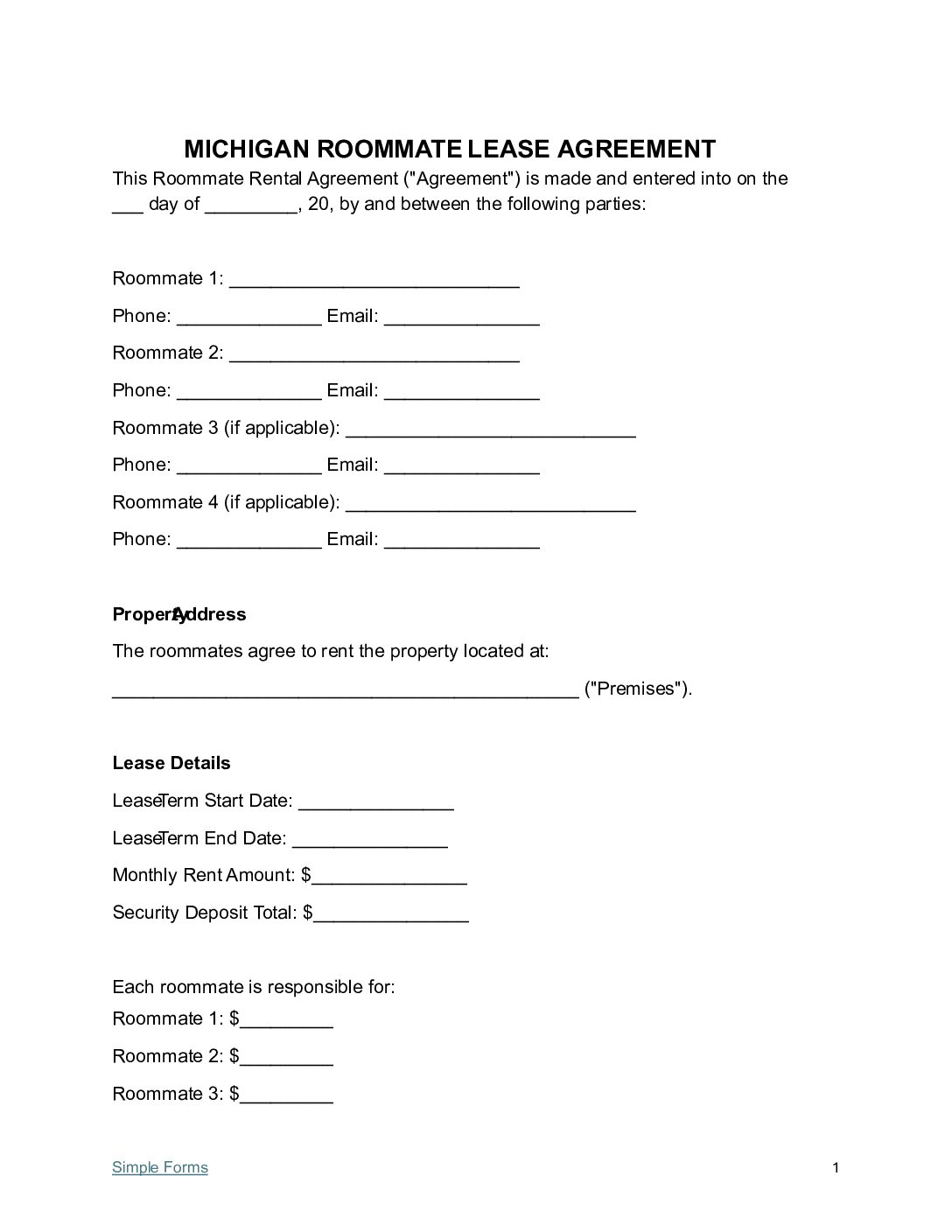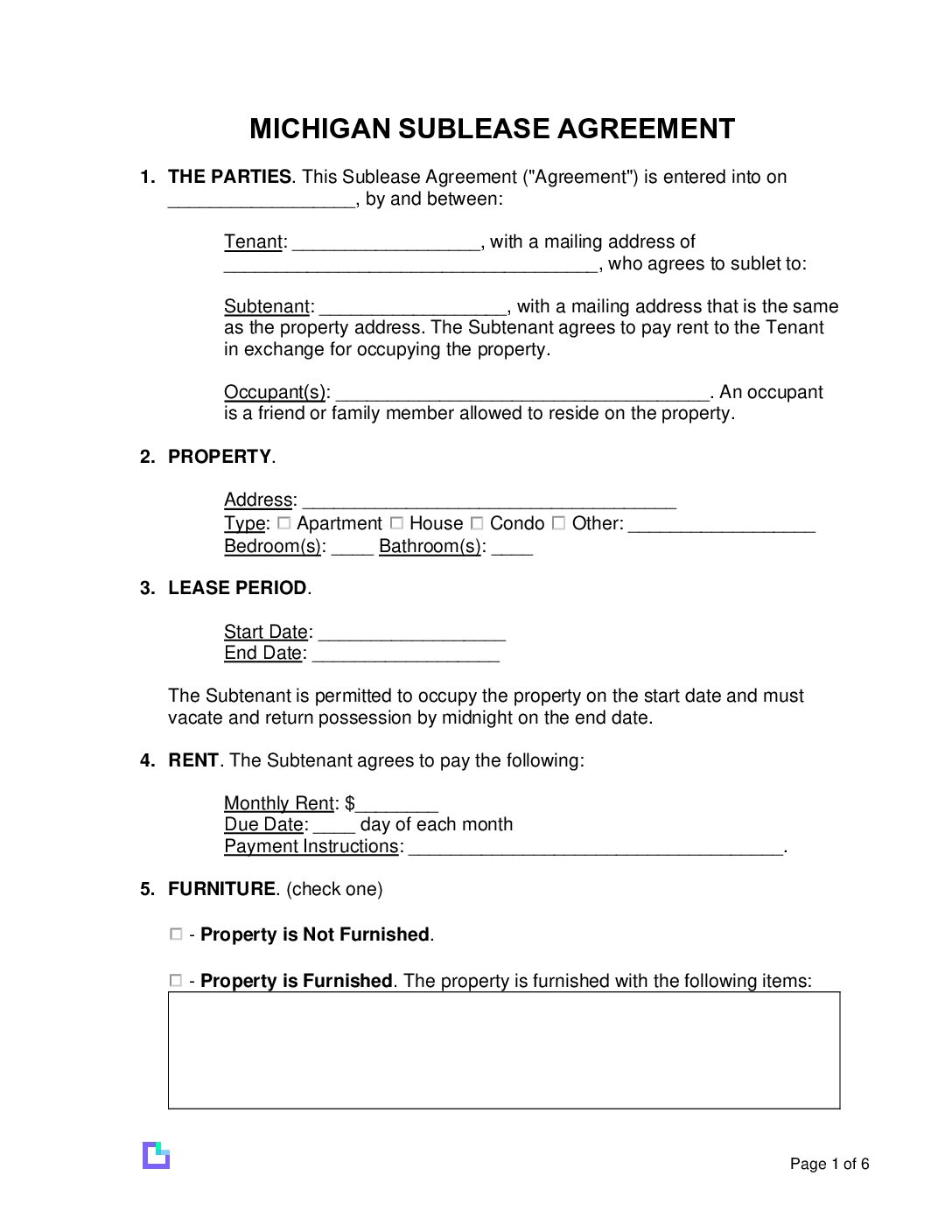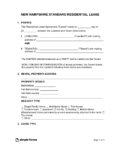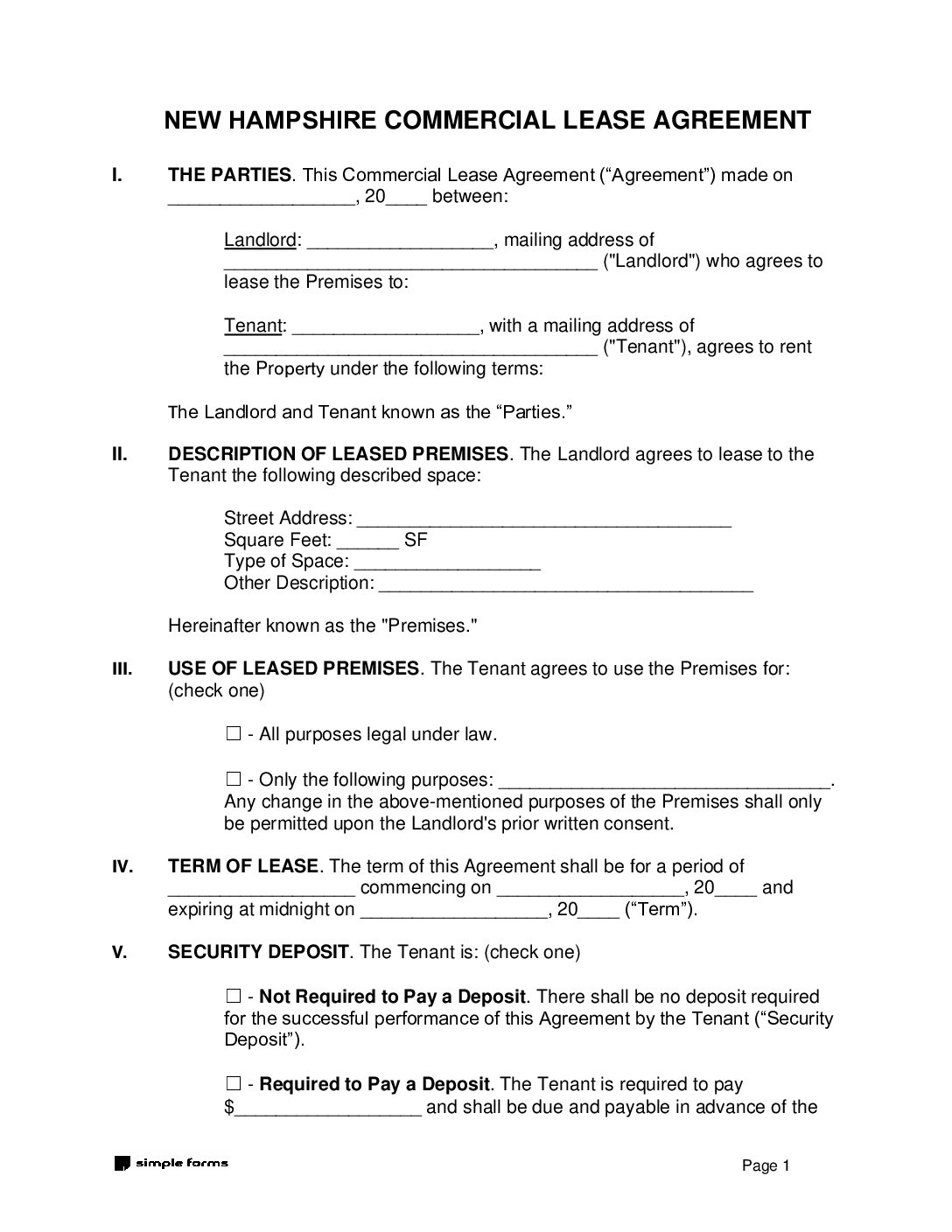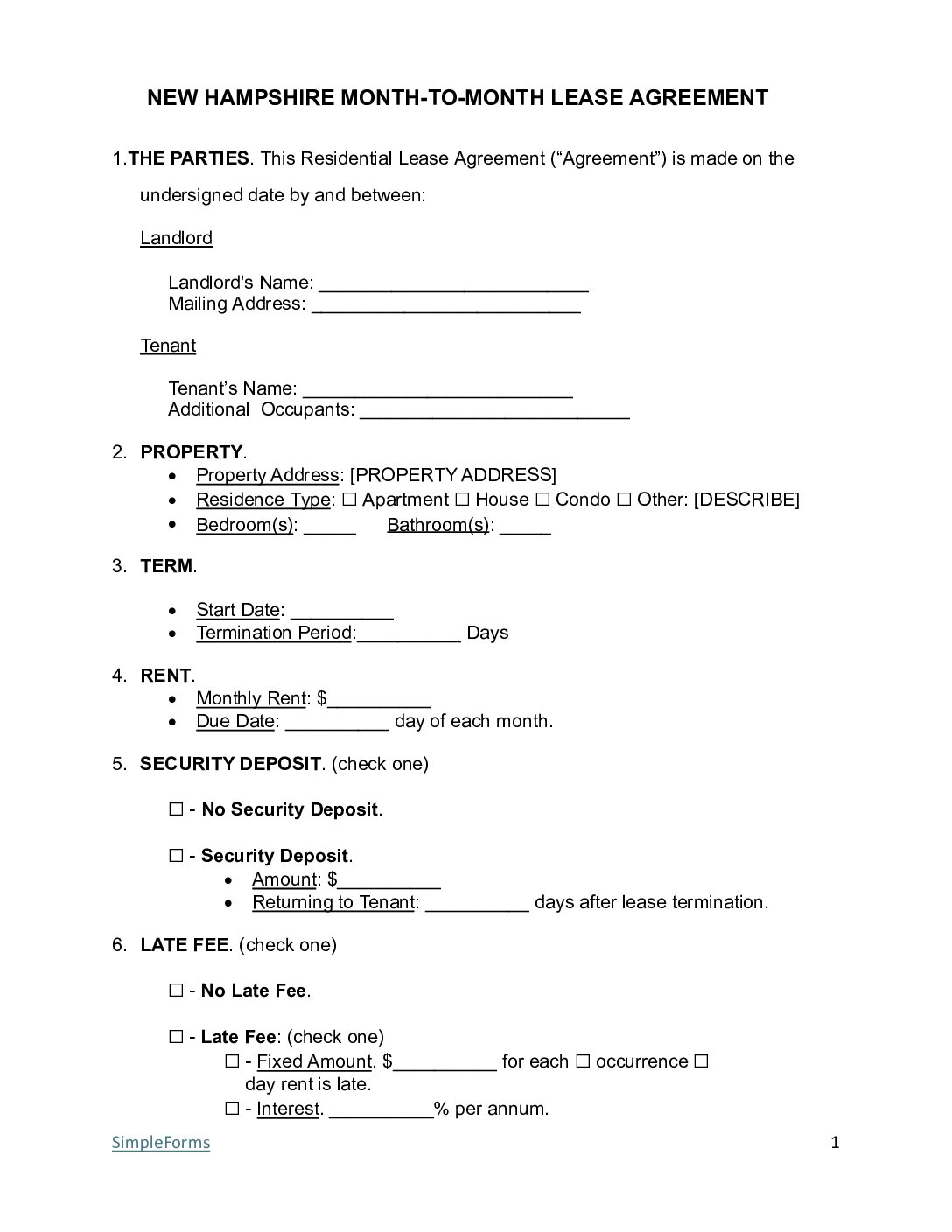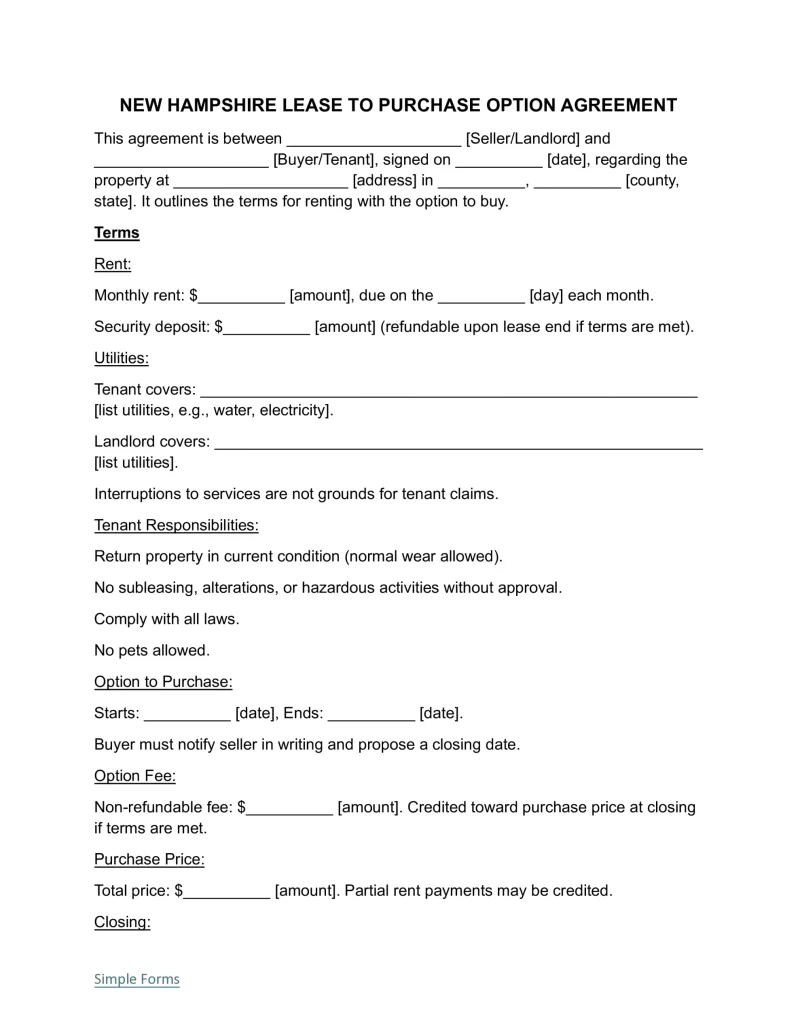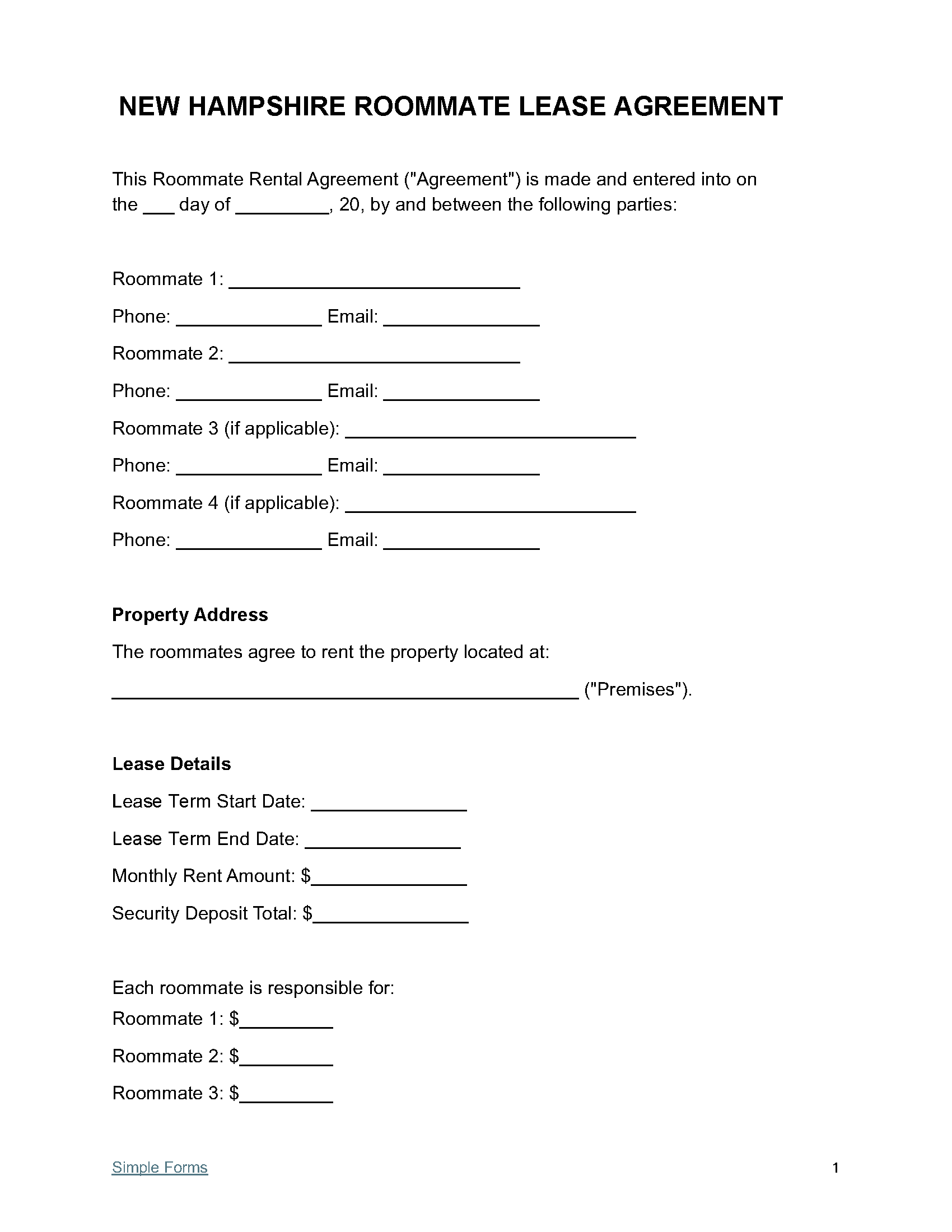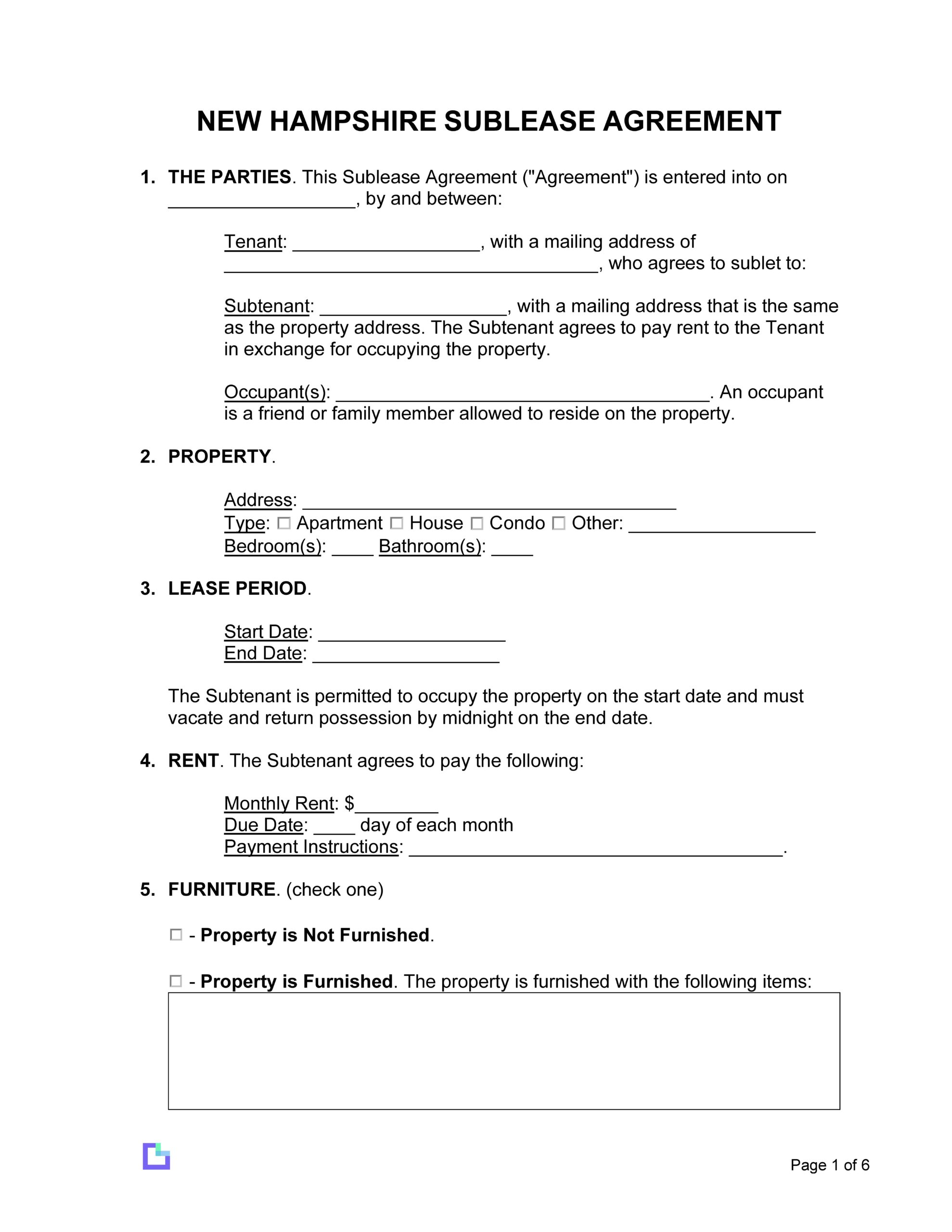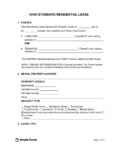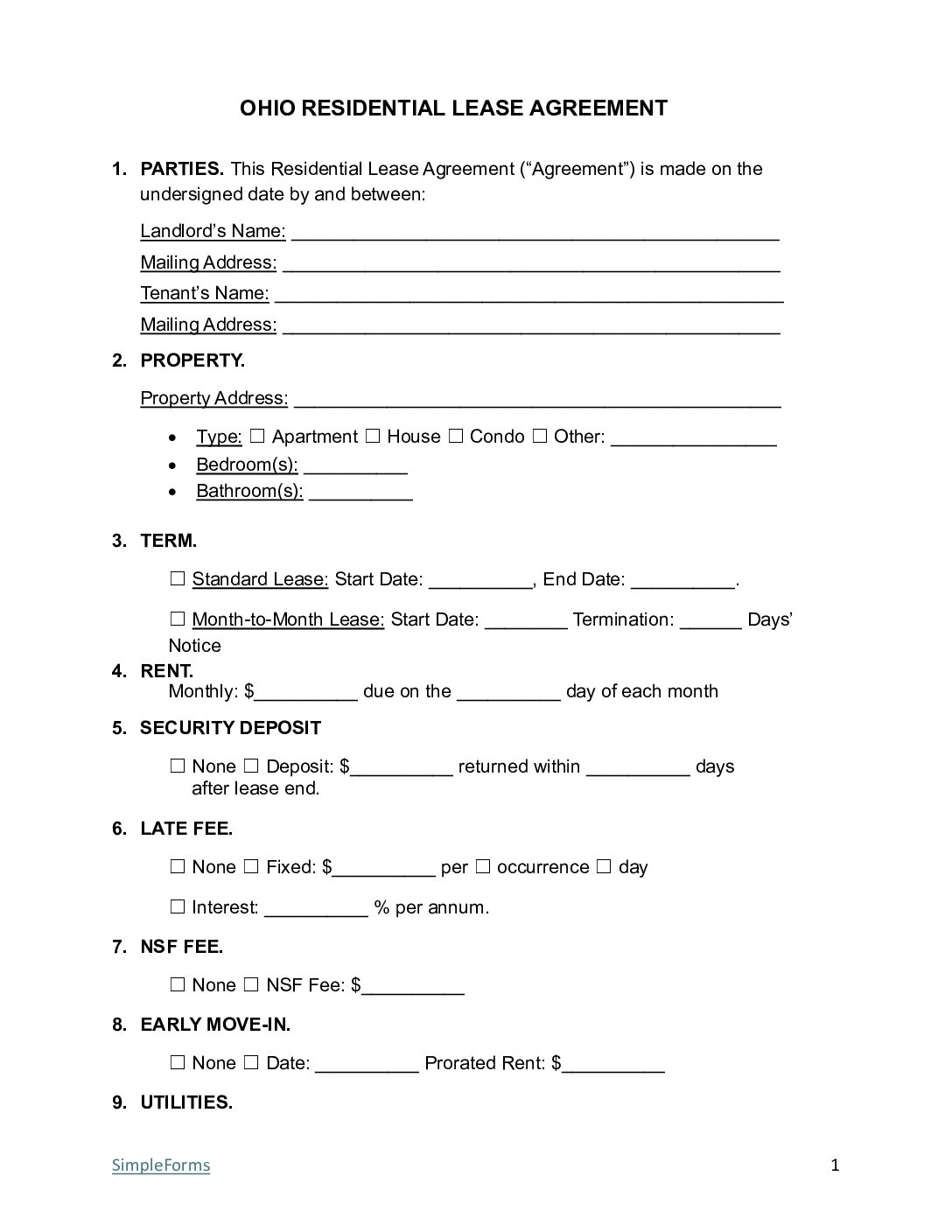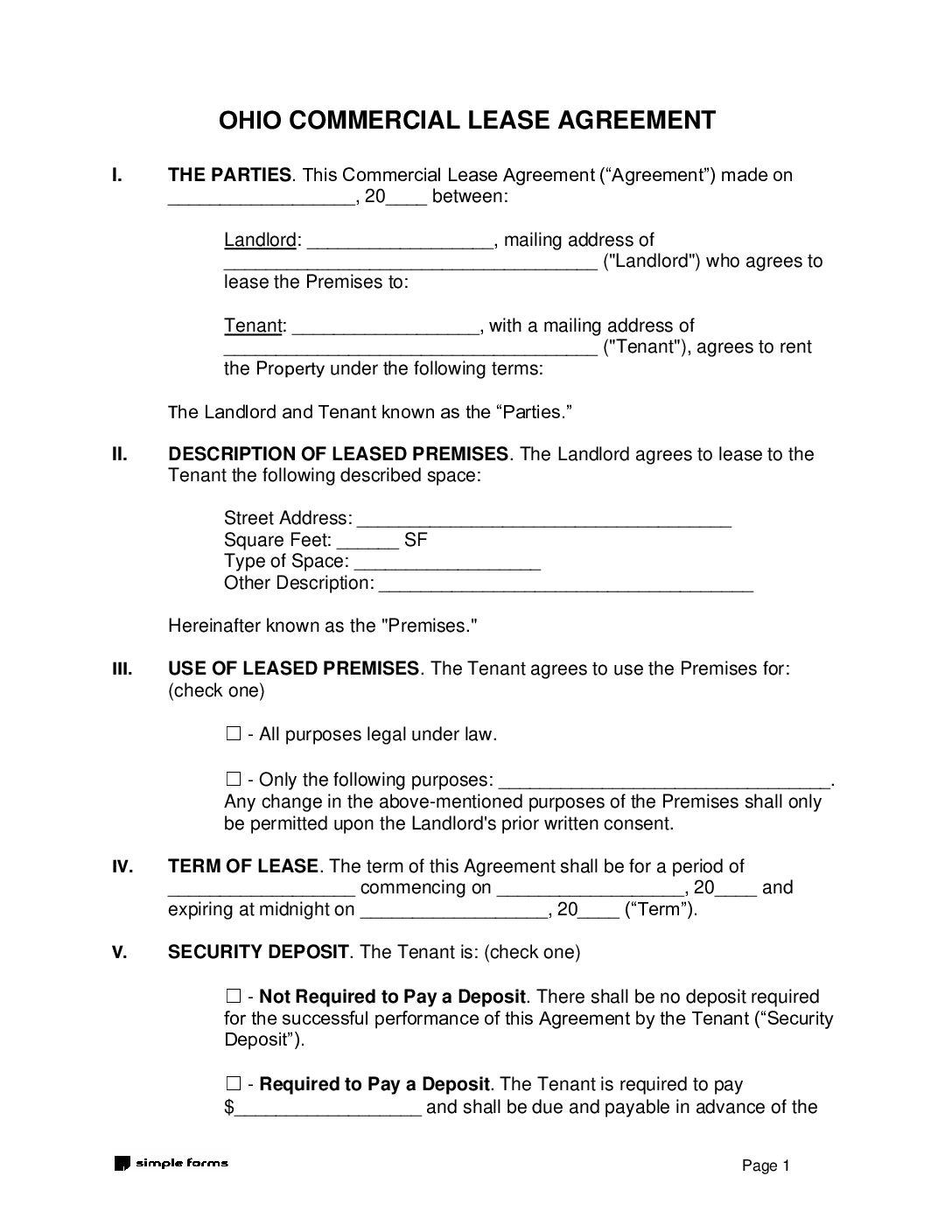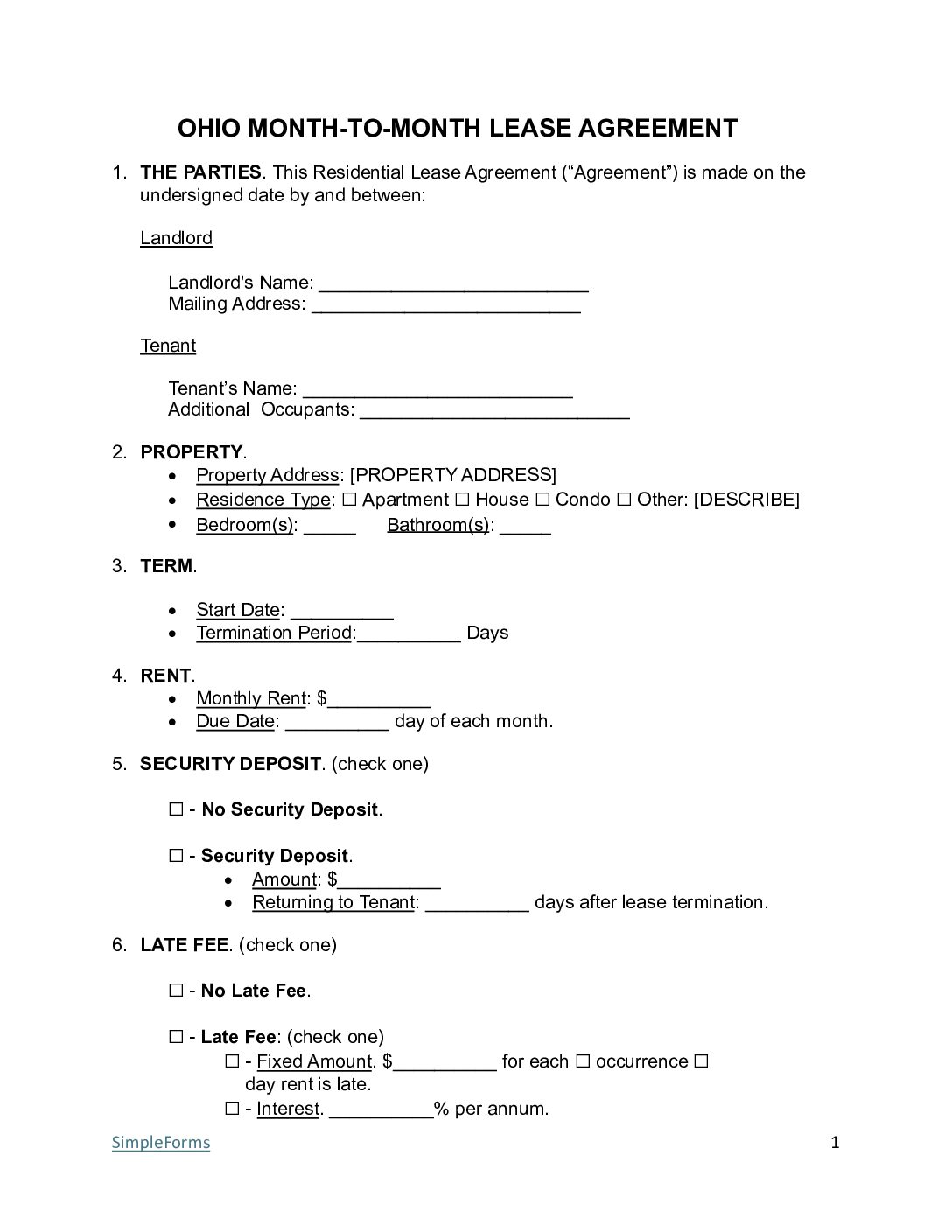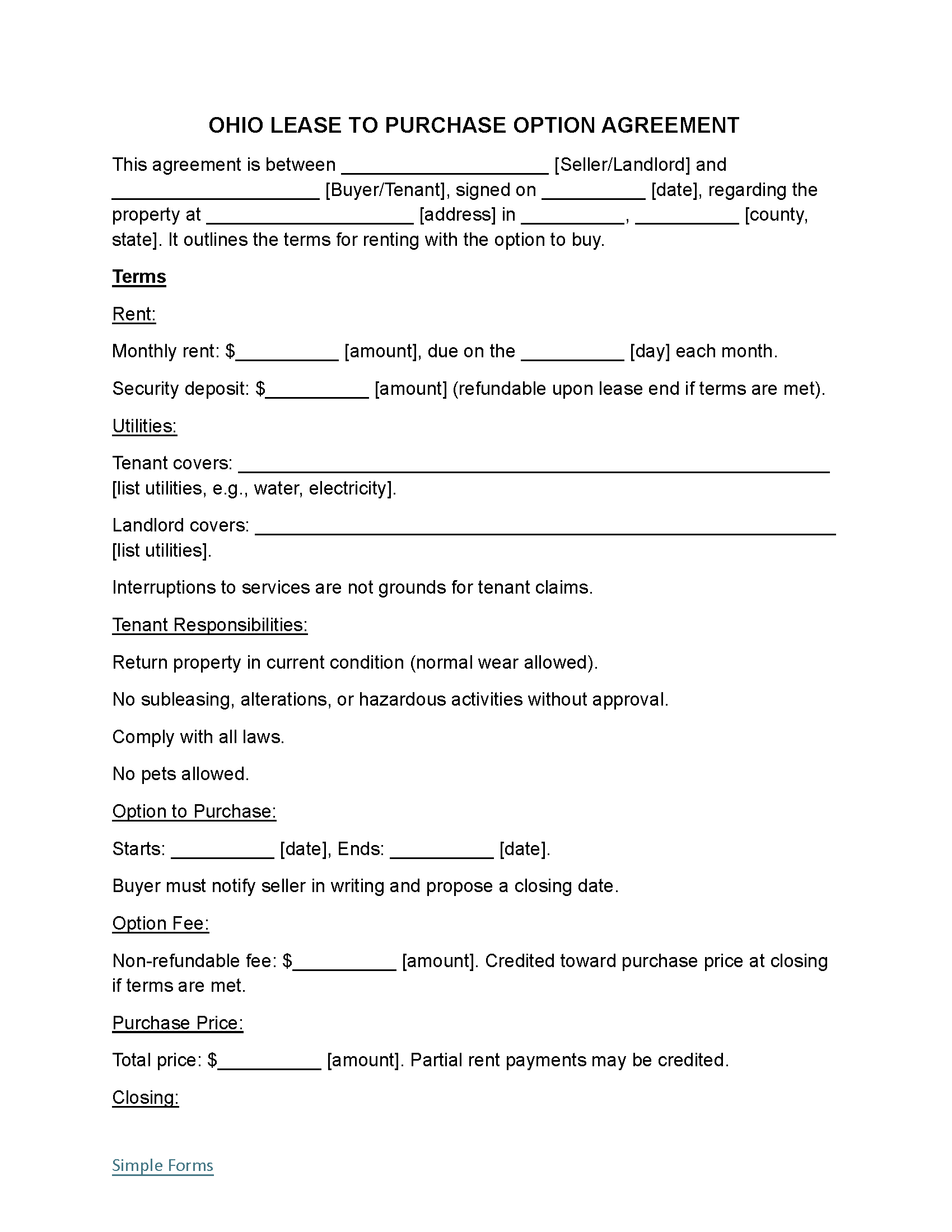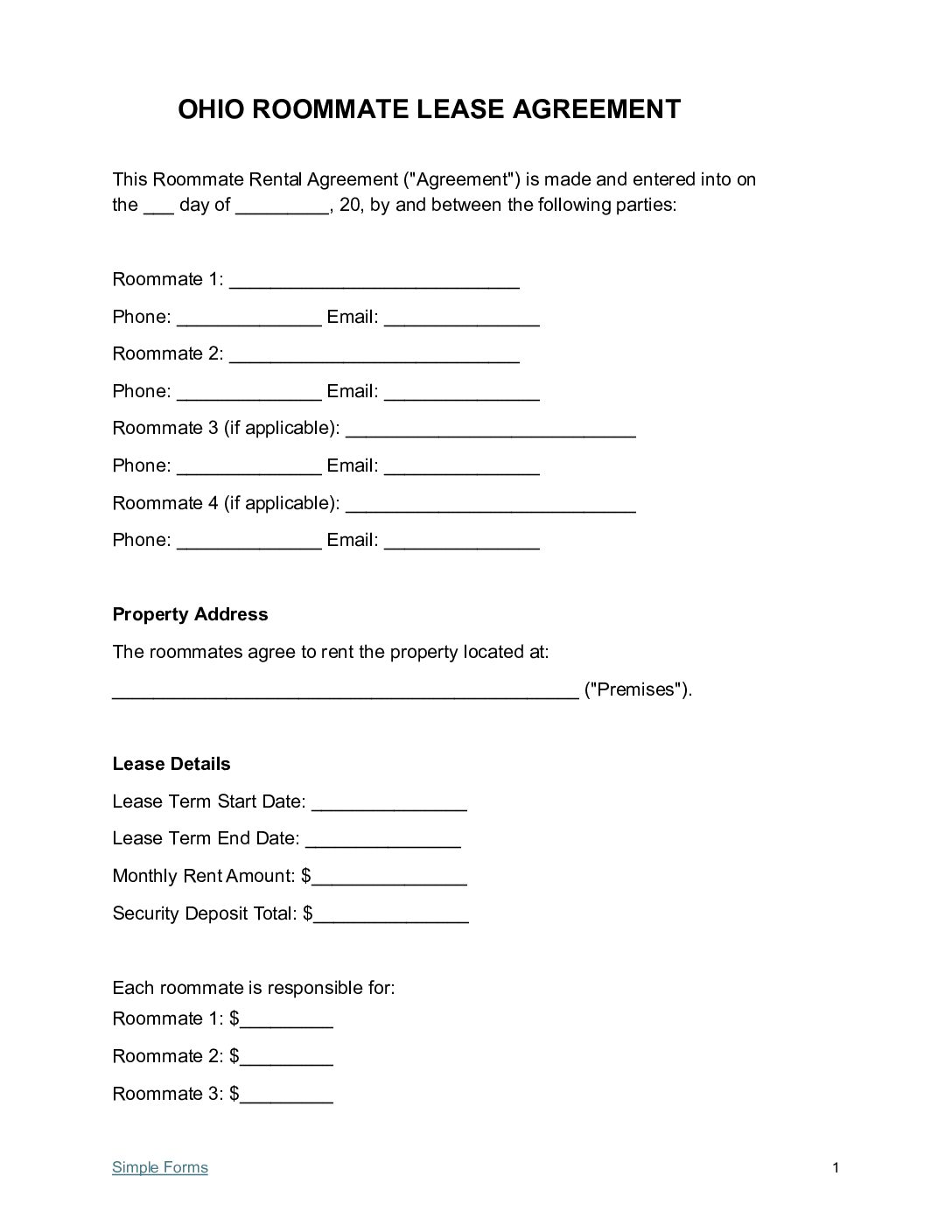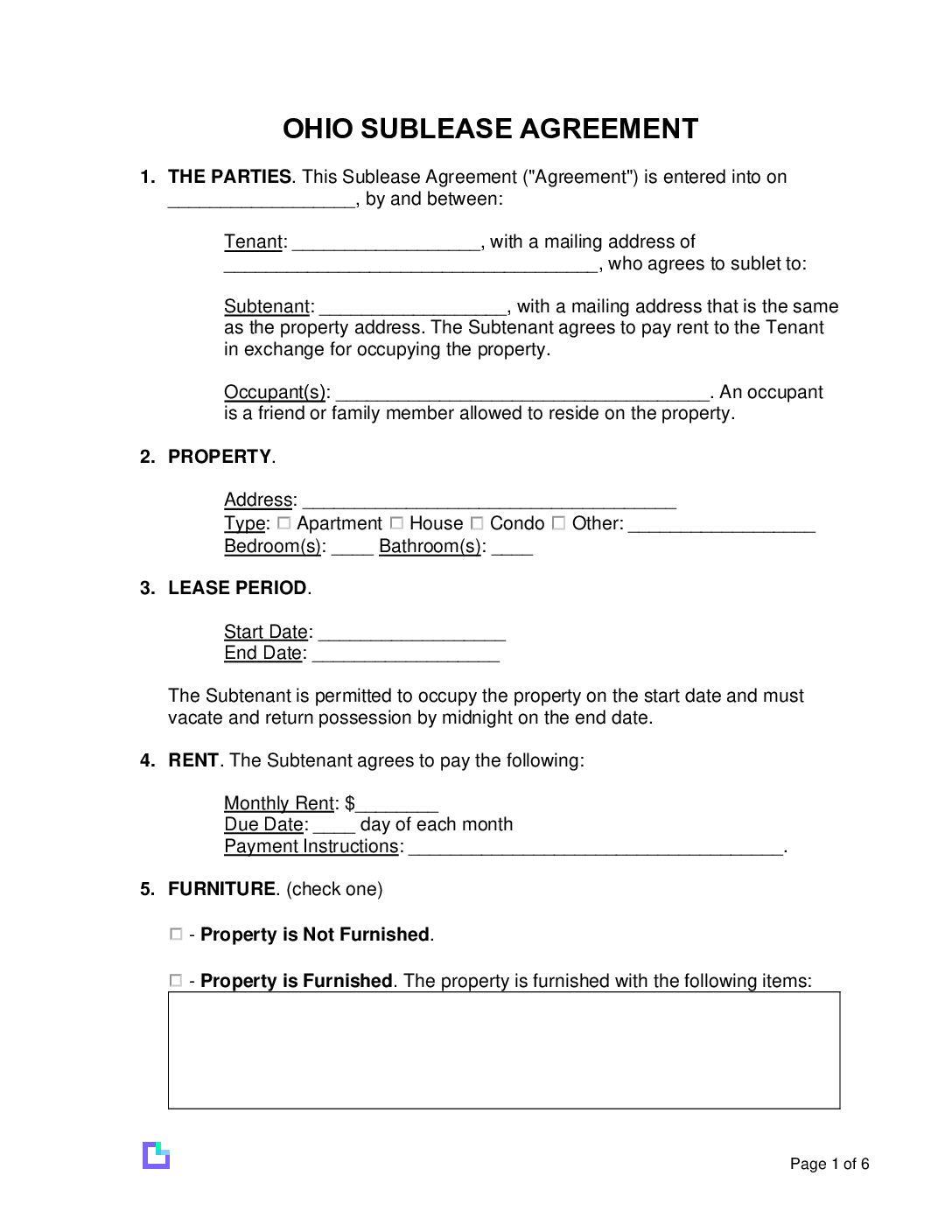By signing this lease, all parties are expected to read and fully understand its terms. A signature confirms agreement and commitment to fulfill the obligations outlined in the lease for its duration.
Lease Agreement
Chicago Required Disclosures
- Bed Bug Educational Brochure (§ 5-12-101): Before signing a rental agreement, the landlord must provide a brochure on bed bug prevention and treatment to the tenant. The Department of Health’s “Bed Bug Prevention and Treatment” brochure is recommended.
- Estimate of Heating Costs (§ 5-16-010): If the tenant pays for heating, the landlord must include an estimate of heating costs for the next 12 months in the lease. The landlord can request an estimate from the city using the Heating Cost Request Form.
- Landlord’s Identity (§ 5-12-090): The landlord must disclose their name, address, and phone number.
- Code Violations (§ 5-12-100(a)): The landlord must disclose any code violations received in the last 12 months.
- Chicago Residential Landlord and Tenant Ordinance Summary (§ 5-12-170): The landlord must attach a summary of the ordinance to the rental agreement.
- Security Deposit Receipt (§ 5-12-080(b)): If a security deposit is collected, the landlord must provide a receipt.
- Security Deposit Interest Rate (§ 5-12-170): The lease must include the current interest rate for security deposits.
- Recycling Disclosure (Domu.com): In buildings with more than 6 units, the landlord must provide information about recycling procedures to each tenant.
*Note: These disclosures are not required if the landlord lives in a building with 6 or fewer units.
State Disclosures
- Carbon Monoxide Detectors (§ 5-12-101)– Landlords must provide a detector near where the tenant sleeps, and include this in the lease.
- Rent Concession (765 ILCS 730/3)– Any rent discount must be listed in the lease with “Concession Granted” in at least ½-inch text.
- Lead-Based Paint & EPA Pamphlet (EPA.gov)– Homes built before 1978 need a lead paint warning in the lease.
- Radon Disclosure (420 ILCS 46/26) – Landlords must provide radon info and the “Radon Guide for Tenants.”
- Smoke Detectors (425 ILCS 60/3(d)) – Landlords must install detectors, but tenants maintain them during the lease.
- Shared Meter (if applicable) (765 ILCS 740/5(a)) – Landlords must explain how shared utility costs are calculated.
Frequently Asked Questions
- Question: Does Chicago require electric and heating disclosure for apartment lease?
-
- Answer (Chicago.gov): Yes, in Chicago, landlords are required to provide tenants with both a heating cost disclosure and an energy disclosure prior to signing a lease.
Sample Illinois (Chicago Only) Residential Lease Agreement PDF Template
https://simpleforms.com/wp-content/uploads/2024/11/Illinois-Chicago-Only-Residential-Lease-Agreement-Template.pdf
By Type (6)
| Residential Lease Agreement – Standard 1-year lease term. Download: PDF | Word (.docx) |
|
| Commercial Lease Agreement – Used for retail spaces, office buildings, warehouses, and industrial facilities. Download: PDF |
|
| Month-to-Month Lease Agreement – Tenancy at will with renewals every 30 days. Download: PDF | Word (.docx) |
|
| Rent to Own Lease Agreement – A lease that includes an option for the tenant to purchase the property. Download: PDF | Word (.docx) |
|
| Room Rental Lease Agreement Template – Shared living arrangements. A binding contract outlining responsibilities and agreements between co-tenants. Download: PDF | Word (.docx) |
|
| Sublease Agreement – Used to Sublet unit with landlords approval. Download: PDF | Word (.docx) |
What does the District of Columbia Lease Agreement Cover?
This document includes the following laws between the landlord and tenant in Washington D.C.:
- Washington D.C. Residential Landlord & Tenant Act
- Security Deposit Law
- Lease Termination
- Landlord’s Access to the Property
- Rent Due Date plus Late Fees
- Required Disclosure Forms
Washington D.C. Residential Landlord & Tenant Act
The Washington D.C. Residential Landlord and Tenant Act is a guide for landlords and tenants that outlines the legal rights and responsibilities. It covers lease agreements, rent regulations, eviction processes, maintenance responsibilities, and dispute resolutions. [1]
Security Deposit Requirements
Landlords in Washington D.C. can require a security deposit and must return it within 45 days after the tenant vacates, minus any deductions for damages.
- 45 Days – Timeframe to return the deposit. [2]
- Deductions (if any) must be itemized.
- Normal wear and tear cannot be deducted.
Lease Termination Rules for the Landlord and Tenant
Leases in Washington D.C. may be terminated by either party under the following rules:
- Landlord’s Ability to Terminate
- 5-day notice for nonpayment of rent.
- 30-day notice for material noncompliance with the rental agreement.
- Tenant’s Ability to Terminate
- With proper written notice for unsafe conditions or habitability issues.
- 30 days’ notice to terminate a month-to-month lease. [3]
Landlord’s Access to the Rental Property
Rent Due Dates and Late Fees
- Late Fees – Must be written in the agreement.
- Grace Period – 5-day grace period.
- NSF Fee – $40 per bounced rent check. [5]
Required Disclosure Forms
- Lead-Based Paint Disclosure Form – Landlords must disclose lead-based paint if the property was built before 1978. [6]
- District of Columbia Tenant Bill of Rights – This document outlines the rights and responsibilities of the tenants.[7]
- RAD Form 3 – This form is used by landlords in rent-controlled buildings to notify tenants of any adjustments in the rent.[8]
- RAD Form 5 – This form notifies tenants of rent changes due to reduced services or increased costs under the city’s Rental Housing Act of 1985.[9]
- Bed Bug Fact Sheet– This form us used to discloses any bed bug infestations on the rental property. [10]
Sample District of Columbia Lease
By Type (6)
What the Montana Lease Agreement Form Covers?
This document includes the following subjects that pertain to the laws regarding the relationship between the landlord and tenant in Montana:
- Montana Residential Landlord and Tenant Act
- Security Deposit Law
- Lease Termination
- Landlord’s Access to the Property
- Rent Due Date plus Late Fees
- Eviction Procedures
- Tenant Property Maintenance Responsibilities
- Required Disclosure Forms
- Hunting Land for Lease Regulations
Montana Residential Landlord and Tenant Act
Residential leases are regulated by the Montana Residential Landlord and Tenant Act of Title 70, Chapter 24 of the Montana Code Annotated.
- Maintenance of the Property – Landlords and tenants must keep properties safe and livable, fixing issues such as plumbing, heating, or structural problems.[1]
Security Deposit Law
Summary:
- Maximum Amount – No limit. Landlords can request any amount as there are no laws governing maximum amounts.
- Returning to the Tenant – Ten (10) days from the lease end date.[2]
- Deductions – The landlord must create an itemized list and provide to the tenant.
- What cannot be deducted? – Normal wear and tear cannot be deducted by the tenant.
Lease Termination Rules for Landlords and Tenants
Summary: Both landlords and tenants have rights to terminate a lease under the following conditions.[3]
- Week-to-week – can be ended by either the landlord or tenant with at least 7 days’ written notice before the specified end date.
- Month-to-month – can be ended by either party with at least 30 days’ written notice before the specified end date.
Landlord’s Access to the Rental Property
Rent Due Dates and Late Fees
- Grace Period – No grace period.
- Maximum Late Fee – No limit amount. Should be clearly stated in the lease agreement.
- Returned Checks (NSF) – $30 per bounced check.
Eviction Procedures and Notices
Tenant Property Maintenance Requirements
Summary: Tenants can request repairs in writing and terminate the lease or seek damages if repairs are not addressed within 14 days.[7]
Required Disclosure Forms
Summary:
- Lead-Based Paint Disclosure – Required for properties built before 1978.[8]
- Landlord Contact Information – Must include the landlord’s name and address in the lease agreement.
- Mold Disclosure Form – A mold disclosure form informs tenants about any mold presence or history in a property.[9]
- Methamphetamine Disclosure For – This form informs tenants about past or current meth contamination on a property.[10]
- Move-in Checklist – A move-in checklist documents a property’s condition at the start of a rental. This is required in order to prevent security deposit disputes.[11]
- Post-Move Out Notice of Additional Cleaning (conditional) – Landlords can use if the tenant has left cleaning tasks unfinished that are not considered normal wear or your regular maintenance duty after the end of the lease and tenant moves out.[12]
Hunting Land for Lease Regulations
Sample Montana Rental Lease Agreement
By Type (8)
| Residential Lease Agreement Download: PDF | Word (.docx) |
|
| Association of Realtors Download: PDF |
|
| Apartment Association Lease Agreement – Used for apartment leases in Missouri. Download: PDF |
|
| Commercial Lease Agreement Download: PDF |
|
| Month-to-Month Lease Agreement Download: PDF | Word (.docx) |
|
| Rent to Own Lease Agreement – Download: PDF | Word (.docx) |
|
| Room (Roommate) Rental Lease Agreement – Used for shared living space between co-tenants. Download: PDF | Word (.docx) |
|
| Sublease Agreement Download: PDF |
What the Missouri Residential Lease Agreement Covers?
This document addresses the landlord-tenant laws in Missouri, including the following topics:
- Missouri Landlord-Tenant Laws
- Security Deposit Regulations
- Lease Termination
- Landlord’s Right of Entry
- Rent Payment and Late Fees
- Eviction Procedures
- Property Maintenance Responsibilities
- Required Disclosures
Missouri Landlord-Tenant Laws
Summary: Missouri’s landlord-tenant laws establish guidelines for lease agreements, including tenant rights, property habitability standards, and legal procedures for addressing disputes.
Security Deposit Regulations
Summary (§ 535.300(1), § 535.300(2)):
- Maximum Amount: Equivalent to two (2) months’ rent.
- Return Deadline: Landlords must return the deposit within 30 days of lease termination.
- Itemized Deductions: Required for any deductions, such as damages beyond normal wear and tear.
- Interest: No requirement to pay interest on deposits as any interest collected belongs to the landlord.
Lease Termination Rules
Summary (§ 441.060): Both landlords and tenants must follow notice requirements:
- Landlord’s Notice: 30 days for month-to-month leases or per lease terms.
- Tenant’s Notice: 30 days for month-to-month leases.
Landlord’s Right of Entry
Summary (Landlord Tenant Law): Landlords must provide reasonable notice before entering the property, except in emergencies.
Rent Payment and Late Fees
Summary (§ 570.120(5)):
- Rent Due Date: Must be written in the lease.
- Late Fees: Must be reasonable and outlined in the lease agreement.
- NSF Fee: $25 per bounced rent check. If a tenant intentionally gives the landlord a bad check, the tenant will be charge with a penalty criminally and will pay a fine of $750 or more.
Eviction Procedures
Summary (§ 441.770): Missouri law requires landlords to follow legal eviction processes, including providing proper notice and obtaining a court order. The following rules for evictions below:
- Tenants must vacate within 24 hours if eviction grounds are proven, allowing landlords to reclaim the property.
- Individuals involved in criminal activity can be removed without ending the tenancy.
- Eviction or removal orders can be expedited by the court.
- Eviction may be delayed if immediate action poses significant danger outweighing community and plaintiff safety.
Property Maintenance Responsibilities
Summary: Landlords must make the property habitable and comply with local health and safety standards, including plumbing, heating, and structural maintenance.
Required Disclosures
Summary: Landlords must disclose specific information before or at the start of the lease:
- Lead-Based Paint Disclosure (hud.gov): Required for properties built before 1978.
- Security Deposit Terms/Itemized List: (§ 535.300(3)(2)): Include written terms about deposit use and return. If the landlord withholds part of the security deposit for damages, they must provide an itemized list of damages to the tenant’s last known address.
Sample Missouri Rental Lease Agreement
By Type
| Residential Lease Agreement Download: PDF |
|
| Commercial Lease Agreement Download: PDF |
|
| Month-to-Month Lease Agreement – Tenancy at will with renewals every 30 days. Download: PDF | Word (.docx) |
|
| Rent to Own Lease Agreement – A lease that includes an option for the tenant to purchase the property. Download: PDF | Word (.docx) |
|
| Roommate Lease Agreement Download: PDF | Word (.docx) |
|
| Sublease Agreement – Used to Sublet unit with landlords approval. Download: PDF | Word (.docx) |
What the form covers?
This Standard Nebraska Lease Agreement outlines Nebraska landlord-tenant laws. Landlords must maintain properties, return security deposits within 14 days, and give advance notice before entry.
This agreement form includes the following:
- Nebraska Residential Landlord-Tenant Act
- Security Deposit Law
- Lease Termination
- Landlord’s Access to the Property
- Rent Due Date plus Late Fees
- Eviction Procedures
- Property Maintenance
- Tenant Rights
- Rent Control
- Discrimination Protections
- Habitability Standards
- Utilities and Services
Nebraska Residential Landlord-Tenant Act
Summary:
- Maintenance of the Property – Landlords must comply with the health and safety codes to make sure the rental property is safe and habitable.[1]
- Security Deposits – Deposits must be returned within 14 days after a lease end date. If any deductions were made then the landlord needs to provide an itemized list of deductions.
Security Deposit Law
Summary:
- 14 Days – landlords must return the deposit to tenant 14 days from the lease end date.[2]
- Itemized List – Deductions must be itemized by the landlord and shared with the tenant.
Lease Termination
Summary: Both landlords and tenants can terminate a lease under the following conditions:
- Landlord’s Ability to Terminate
- 7-day notice for nonpayment of rent.
- 14-day notice to correct lease violations.
- Tenant’s Ability to Terminate
- Tenants may terminate for reasons such as habitability issues after proper notice to the landlord.
- 30-day notice required for month-to-month leases.[3]
Landlord’s Access to Property
Due Dates / Late Fees
Eviction Procedures
Property Maintenance
Summary: Landlords are required to maintain the property in a habitable condition and respond promptly to repair requests.[7]
- Failure to address repairs may give tenants the option to take legal action.
Tenant Rights
Summary: Nebraska tenants have legal rights, including:
- Right to Privacy – Tenants are entitled to privacy in their rental unit.
- Right to Habitable Housing – The property must meet health and safety standards.[8]
Rent Control
Summary: Nebraska does not have rent control laws, allowing landlords to set rents according to the market.
Discrimination Protections
Summary: Discrimination in housing based on race, color, religion, sex, national origin, disability, or familial status is prohibited.
- Complaints can be filed with the Nebraska Equal Opportunity Commission.[9]
Habitability Standards
Summary: Rental properties must meet basic habitability standards, including:
- Functional plumbing, heating, and electrical systems.
- Safe and sanitary living conditions.[10]
Utilities and Services
Summary: Landlords must cover shared utility meter costs unless the lease specifies a fair tenant billing system. Utilities covered by landlords include water, sewer, trash collection, and sometimes heating in multi-unit buildings. Landlords cover basic utilities unless stated otherwise in the lease. [11]
Sample Nebraska Rental Lease Agreement
Sources
- Nebraska Statutes § 76-1401
- Nebraska Statutes § 76-1416
- Nebraska Statutes § 76-1431
- Nebraska Statutes § 76-1423
- Nebraska Statutes § 76-1414
- Nebraska Statutes § 76-1441
- Nebraska Statutes § 76-142
- Nebraska Statutes § 76-1419
- Nebraska Equal Opportunity Commission
- Nebraska Statutes § 76-1424
- Nebraska Statutes § 76-1482
By Type (7)
| Residential Lease Agreement – A contract for renting a home or apartment. Download: PDF | Word (.docx) |
|
| Association of Realtors Lease Agreement – An Association of Realtors Lease Agreement is a standard residential lease contract created by real estate professionals. Download: PDF |
|
| Commercial Lease Agreement – A rental agreement used for business property. Download: PDF |
|
| Month-to-Month Lease Agreement – A rental agreement that can be ended each month with notice. Download: PDF | Word (.docx) |
|
| Rent-to-Own Lease Agreement Download: PDF | Word (.docx) |
|
| Roommate Lease Agreement Download: PDF | Word (.docx) |
|
| Sublease Agreement Download: PDF | Word (.docx) |
What the Michigan Residential Lease Agreement Form covers?
This agreement includes the following subjects that related to the laws regarding the relationship between the landlord and tenant in Michigan:
- Massachusetts Landlord-Tenant Act
- Security Deposit Law
- Lease Termination
- Landlord’s Access to the Property
- Rent Due Date and Late Fees
- Eviction Procedures
- Property Maintenance
- Required Disclosure Forms
Michigan Landlord-Tenant Act
Security Deposit Law
Summary (§ 554.602, § 554.603):
- 30 Days – The landlord must return the security deposit within 30 days of the lease end date.
- Itemized List – Any deductions for repairs must be in an itemized list and sent to the tenant along with the security deposit check.
- Maximum Amount – The maximum amount landlords can charge tenants is 1 and 1/2 months rent.
- Interest – Michigan does not mandate collecting interest on security deposits. The deposit must be held in a financial bank account.
Lease Termination Rules for Landlords and Tenants
Summary (§ 554.601b(1)): Michigan law allows both parties to terminate a lease with the following notices.
- Landlord’s Right to Terminate – Landlords can terminate the lease if they believe the tenant ‘in good faith’ has abandoned the rental property and the rent is not paid.
- Tenant’s Right to Terminate – Tenants can terminate if a child is in danger and/or there’s a situation that involves domestic violence, sexual assault, or stalking. Tenants who have lived in the units for longer than 13-months can also terminate the lease without a penalty.
Landlord’s Access to the Rental Property
Rent Due Dates and Late Fees
- Grace Period – There’s no grace period in Michigan.
- Notice to Quit – 7-day notice to quit for late rent.
- Maximum Penalty – No maximum amount therefore landlords can charge any amount.
- NSF Fee – $25 per bounced rent check.
Eviction Procedures and Notices
Property Maintenance Requirements and Utilities
Required Disclosure Forms (6)
Summary: Landlords must disclose the following information before the lease starts.
- Lead-Based Paint Disclosure and EPA Brochure (epa.gov) – This disclosure is required by Federal law for all residential properties built before 1978.
- Security Deposit Receipt (§ 554.603) – Landlords cannot require a security deposit unless the tenant is notified at least 14 days before the move-in date.
- Truth in Renting Act (§ 554.634(2)) – The agreement must adhere to the Truth in Renting Act.
- Inventory Checklist (§ 554.608) – The landlord must complete an inventory checklist before and after the tenant moves in.
- Notice Info (§ 554.634(1)) – The landlords mailing address where notices can be sent must be written in the agreement.
- Domestic Violence Victims – Tenants have the right to end a lease without any penalties if they are a victim of domestic violence.
FAQs
How to write a 90-day lease in Michigan?
Include rent, duration, and Michigan rental laws.
Sample Michigan Rental Lease Agreement
By Type (6)
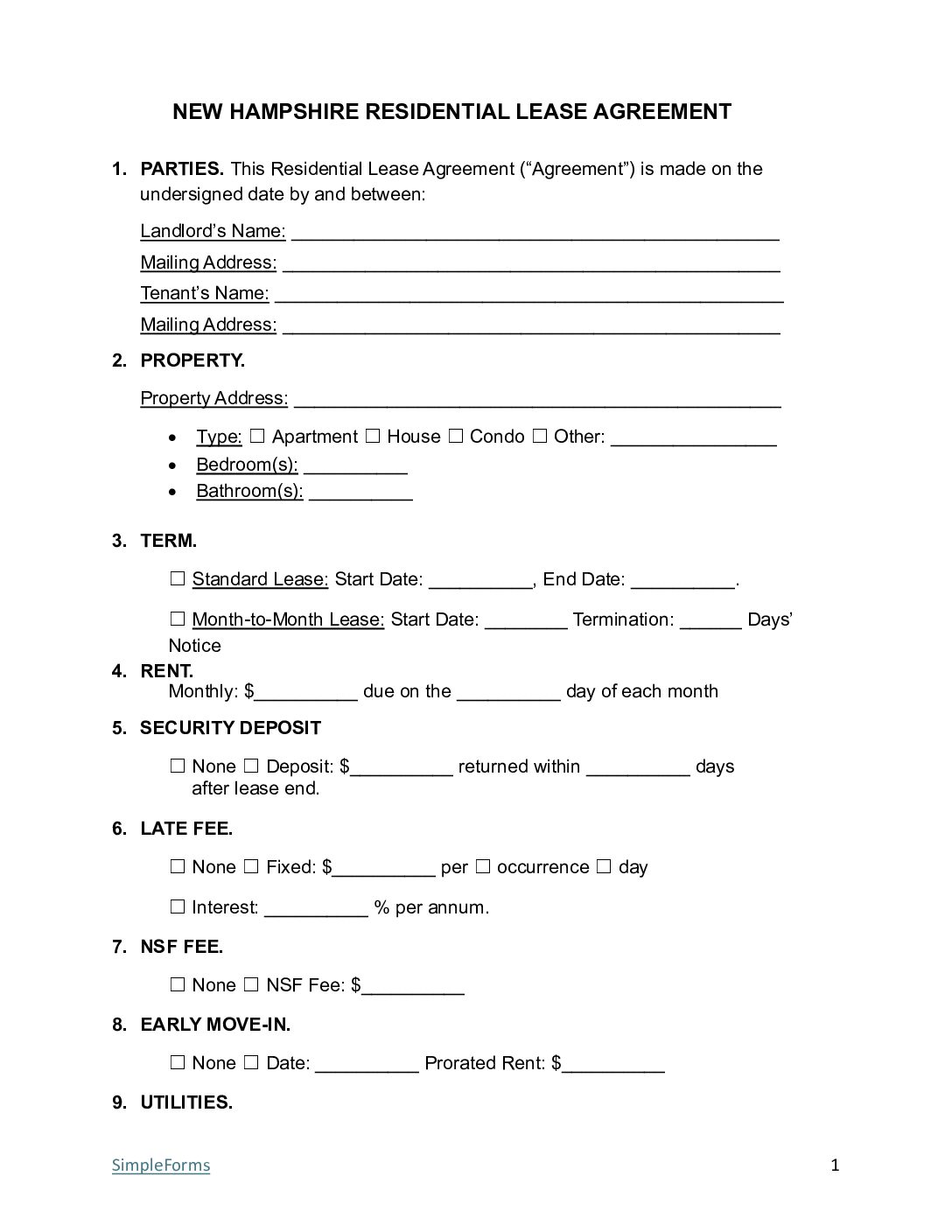 |
Residential Lease AgreementUsed between a Landlord and Tenant for a lease term of one year or more. |
Commercial Lease AgreementFor Business use only. |
|
Month-to-Month LeaseUsed for monthly rentals. |
|
Rent-to-Own Lease AgreementUsed for renters who wish to purchase the property at the end of the lease. |
|
Room Rental Lease AgreementUsed by Tenants who rent a room to a roommate. |
|
Sublease AgreementThis form is used to lease Tenants unit to a Sublessee. |
What does the form cover?
This New Hampshire rental Lease Agreement includes New Hampshire landlord-tenant laws:
- New Hampshire Residential Landlord-Tenant Laws
- Security Deposit Law
- Lease Termination
- Landlord’s Access to the Property
- Required Disclosure Forms
- Rent Due Date plus Late Fees
New Hampshire Residential Landlord-Tenant Laws
Security Deposit Law
Summary:
- 30 Days – Landlords must return the deposit to tenants within 30 days of lease termination.[2]
- Itemized List – Deductions must be itemized and shared with the tenant.
- Maximum – The security deposit cannot exceed one (1) month’s rent or $100 (pick the higher value).
Lease Termination
Summary: Both landlords and tenants can terminate a lease under certain conditions:
- Landlord’s Ability to Terminate
- 7-day notice for nonpayment of rent.
- 30-day notice for other violations.
- Tenant’s Ability to Terminate
- Tenants may terminate due to habitability issues after notifying the landlord.
- 30-day notice is required for month-to-month leases.[3]
Landlord’s Access to Property
Required Disclosure Forms (3)
- Lead-Based Paint Disclosure Form – Landlords must provide a brochure if the property was built before 1979.[5]
- Move-in Checklist – The landlord must notify the tenant to report any property issues upon moving in. The tenant has five (5) days to provide a list of repairs needed to avoid responsibility at the end of the lease.
- Methamphetamine Disclosure – Properties previously used to manufacture methamphetamines must be appropriately disclosed.
Paying Rent
- Grace Period – No grace periods in the state of New Hampshire.
- Maximum Late Fee – Landlords can charge any amount for late rent as New Hampshire has no laws governing late fees.
- NSF Fees – No laws mandating NSF fees in New Hampshire.[6]
Sample New Hampshire Rental Lease Agreement
By Type (6)
| Residential Lease Agreement – A fixed-term lease that lasts 12 months but can be set for any length of time agreed on by the landlord and tenant. Download: PDF | Word (.docx) |
|
| Commercial Lease Agreement – A contract for renting space used for business, like offices, stores, or warehouses. Download: PDF |
|
| Month-to-Month Lease Agreement – A flexible rental contract that renews each month until either party gives 30 days’ written notice to end it. It’s ideal for short-term or uncertain housing needs.
|
|
| Rent to Own Lease Agreement – A lease that includes an option for the tenant to purchase the property. Download: PDF | Word (.docx) |
|
| Roommate Lease Agreement – Made for people sharing a home, where each person has their own bedroom and shares the common areas. Download: PDF | Word (.docx) |
|
| Sublease Agreement – An agreement between a tenant and subtenant, where the subtenant takes over the lease with the landlord’s approval and must follow all terms of the original lease. Download: PDF | Word (.docx) |
What does the Ohio rental lease agreement form cover?
This Ohio Lease Agreement includes Ohio landlord-tenant laws. Landlords must maintain properties and keep up with local housing codes, return security deposits, and give advance notice to tenants before entry.
This agreement form includes the following:
- Ohio Residential Landlord-Tenant Act
- Security Deposit Law
- Lease Termination
- Landlord’s Access to the Property
- Rent Due Date plus Late Fees
- Eviction Procedures
- Property Maintenance
- Tenant Rights
- Rent Control
- Discrimination Protections
- Habitability Standards
- Utilities and Services
- Required Disclosure Forms
Ohio Residential Landlord-Tenant Act
The Ohio Residential Landlord-Tenant Act, in Chapter 5321 of the Ohio Revised Code, outlines the rights and responsibilities of landlords and tenants. [1]
Security Deposit Law
- 30 Days – Landlords must return the deposit to tenants within 30 days of the lease end date.[2]
- Itemized List – Deductions must be itemized by the landlord and shared with the tenant.
- Maximum – The maximum amount is equal to the total amount of three (3) months’ rent.
- Interest on Security Deposits – Landlords are not required to collect or pay interest on security deposits.
Lease Termination
Both landlords and tenants can terminate a lease under the following conditions:
- Landlord’s Ability to Terminate
- 3-day notice for nonpayment of rent.
- 7-day notice to correct lease violations.
- Tenant’s Ability to Terminate
- Tenants may terminate for reasons such as habitability issues after proper notice to the landlord.
- 30-day notice required for month-to-month leases.[3]
Landlord’s Access to Property
Due Dates / Late Fees
- Grace Period – Three-day grace period. If rent isn’t paid, a five-day notice to quit can be issued.
- Maximum Late Fee – The landlord can charge up to 5% of the monthly rent.
- NSF Fee – $25 per bounced check.
- Withholding Rent – If the landlord doesn’t maintain the property, tenants can make repairs and deduct up to one (1) month’s rent.
Eviction Procedures
Property Maintenance
Landlords are required to maintain the property in a habitable condition and respond promptly to repair requests.[7]
Tenant Rights
Ohio tenants have legal rights, including:
- Right to Privacy – Tenants are entitled to privacy in their rental unit.
- Right to Habitable Housing – The property must meet health and safety standards.[8]
Rent Control
Ohio does not have rent control laws, allowing landlords to set rents according to the market.
Discrimination Protections
The Fair Housing Act (FHA) prevents landlords from discriminating against tenants based on race, color, national origin, religion, sex, disability, and/or familial status (having children under 18, including pregnancy).
Habitability Standards
Rental properties must meet basic habitability standards, including:
- Functional plumbing, heating, and electrical systems.
- Safe and sanitary living conditions.
Utilities and Services
Landlords cover basic utilities unless stated otherwise in the lease.
Required Disclosure Forms (1)
The following are required by the landlord to disclose to tenants:
- Lead-Based Paint Disclosure & EPA Pamphlet – If the property was built before 1978, the landlord must inform the tenant about lead paint and provide an EPA pamphlet.
Sample Ohio Rental Lease Template
Ohio-Standard-1-Year-Residential-Lease-Agreement
